



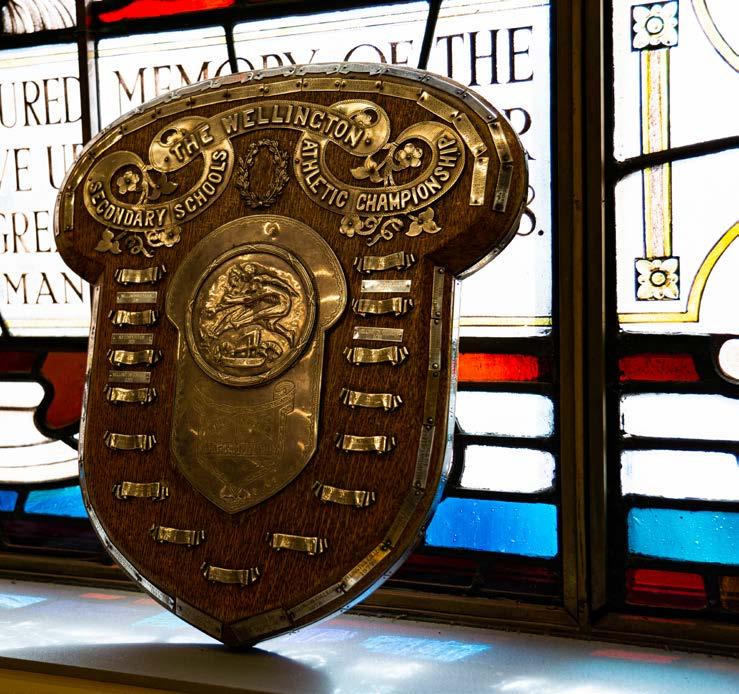








As we embark on 2024, it is my honour to extend warm greetings to each and every one of you. As the President of our Old Boys’ Association, I am deeply humbled by the privilege to serve such a vibrant and accomplished community
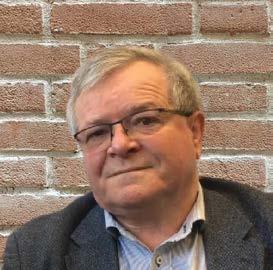
Reflecting on the stories, academic results and sporting triumphs over the past term that the Headmaster refers to in his report, it is evident that our school has played an instrumental role in shaping the individuals we are today. From the cherished memories we hold dear to the invaluable lessons we learned, Wellington College the College continues to serve as a beacon of excellence and a cornerstone of our personal and professional growth.
In the spirit of fostering lifelong connections and a sense of camaraderie, our Association remains committed to providing a platform for engagement, collaboration, and continuous learning. Whether it be through reunions and events, mentoring programmes, or communication pieces, we are dedicated to empowering our Old Boys to thrive in their respective endeavours while also giving back in physical and financial form to our old school
Furthermore, it brings me great pride to highlight the achievements of our Old
Boy and school community in this newsletter, as many of you continue to make headlines with your remarkable accomplishments. From ground-breaking research to innovative entrepreneurial ventures, our Old Boys are making significant contributions across a diverse array of fields, demonstrating the enduring impact of our school's education and valuesReceiving the Light and Passing it On.
As we celebrate these achievements, let us also recognise the importance of staying connected and supporting one another on our respective journeys. Whether it be by sharing your own successes, offering mentoring to current students, or simply staying informed about the remarkable accomplishments of your peers, your involvement in our Old Boy community is both valued and vital.
Without further ado, I'm delighted to advise you of the calendar of events and reunions scheduled for 2024. I look forward to meeting many new faces and reconnecting with others.
My thanks to Steph Kane, Mike Pallin and our small team of volunteers for the sterling work they do for the Association. If you are in the position to assist us, whether it’s in the archives, undertaking research or word
processing/data entry of our records, please get in touch.
May 2024 be filled with joy, prosperity, good health and countless opportunities for growth.
Warm regards,
Ted Thomas President | Class of 1976 | Firth HouseOld Boys are invited to join the 2024 Annual General Meeting.
Wednesday, 22 May Wellington College Pavilion 11.00am
Hosted by President, Ted Thomas with an update of the school given by Headmaster, Glen Denham.
Thereafter, please stay on for a complimentary light lunch and enjoy the Traditional Fixtures against St Patrick’s Town.
RSVP: oldboys@wc.school.nz 17/05/24 or 04 802 2537.
Class of 1994 30 Years On Friday, 1 November
Hamish Langford and Jamie Crump are organising the 30 Years On Reunion for the boys of ‘94. On Friday, 1 November at 3.00pm, we’ll meet Headmaster Glen Denham and take an abridged tour of the school.
Then from 6.00pm, we’ll gather at Mean Doses Tap Room (Level 1, 66 Tory Street) for drinks. We’re also looking at the possibility of another event the following day. You can keep-up-to date with the reunion details HERE or email Hamish: hamish.langford@gmail.com and Jamie: crumpyj@gmail.com
IClass of 2004 20 Years On | Friday, 26 July
t's 2024 which means it's been 20 years since we left Wellington College! So as the tradition goes, we will have a 20 Years On Reunion this year. We will meet at 3.00pm for an abridged tour of Wellington College, with a welcome from the current Headmaster, Glen Denham, and then from around 4.305.00pm there will be drinks and nibbles downtown. There is a Class of 2004 Facebook page which you can join as well.
Saturday, 27 July. A chance for you to catch some Saturday sport at the College and then the possibility of a dinner in the evening (more details to come).

It will be awesome if we can get an even bigger group this time around. Mark Tinkle, Grant Stephens and Charles Thompson are the organisers. Get in touch with Mark at: m.tinkle@wc.school.nz if you would like to register your interest, and make sure your email address on file is up to date! .

I hope this message finds you well.
We have had a brilliant start to the new year. Thank you so much to all in our community for making this happen. Our new Y9 boys have settled in very quickly and their positivity and presence has been fantastic to see.
I want to make special mention of our Y13 leaders who have started the year with servant hearts and want to connect and support the direction of our College. I want to wish our 2024 Head Prefect, Ollie Church all the very best for a great year. You can read more about Ollie within this publication as he introduces himself to you all.
As we are almost at the tail-end of Term One, it brings me great pleasure to update you on the latest developments and achievements here at Wellington College.
Our commitment to academic excellence remains unwavering. I am delighted to tell you that following the 2023 examinations, 95 NZ Scholarships were gained by 45 students across 14 different subjects, nine of which were Outstanding. Henry Isac was recognised by NZQA as one of the top scholars in New Zealand. Henry’s story about his pathway to becoming the 2023 Dux is included in this issue. Henry is a remarkable all-round student. Our NCEA results were also pleasing and I am confident that we will continue to be at the levels we had pre-Covid very soon.
Our sporting teams have been

showcasing exemplary performances on various fronts, bringing home numerous victories and accolades. From triumphs on the field to victories on the water, our students have been demonstrating exceptional athleticism and sportsmanship. Our cricketers, our track and field boys, our rowers, our volleyballers and tennis players have all performed extremely well over the past few weeks and made us all very proud.
These superb results are recorded in this issue. I must also extend my thanks to those Old Boys who have coached or managed our boys to their successes. Without your support and encouragement, I believe we would not have enjoyed the results we have had. Thank you too to those who have been along the sidelines or via social media to express their support and best wishes. Aside from the cricketers and rowers, our boys are already in pre-season training mode in preparation for the winter codes starting next term.
In our commitment to continuous improvement, we have introduced a refreshed uniform design, blending tradition with modernity. This cohort has created history by wearing the refreshed uniform introduced this year. Y9 students will now wear a blazer, shirt and tie, with the option of shorts or trousers. Other cohorts can also wear the refreshed uniform if they wish, until the uniform is phased through each year group. The change will lead to a greater pride in the way we look and give our entire community a huge lift.
Our facilities have also undergone
enhancements, providing our students with refurbished learning environments and grounds that foster creativity, collaboration, and innovation. There are also exciting developments on the horizon with further renovations of our school campus. New buildings and outside facilities are being meticulously planned and constructed to cater to the evolving needs of our students and faculty. These enhancements will provide additional resources and opportunities for growth and development. Please call in for a visit to see the changes and transformations that have taken place over the past term and stop by our wonderful Archives and Museum
As we journey through 2024, I extend a heartfelt invitation to all Old Boys to reconnect with their old school. Your continued support, guidance, and involvement are invaluable to us as we strive for excellence in every endeavour. I look forward to meeting and engaging with you throughout the coming year, whether it be at events, reunions, or other special gatherings. Check the OBA calendar for a list of the events.
In conclusion, I extend my deepest thanks to each of you for your enduring engagement with Wellington College. Together, we have built a legacy of excellence that continues to inspire generations. As we forge ahead into 2024 and beyond, let us remain united in our shared vision of shaping bright futures and creating lasting impact.
Glen Denham, Headmaster

Iam Ollie Church, and this year I am the Head Prefect for 2024. Over the past four years, Wellington College has given me the opportunity to take part in a multitude of different kaupapa, ranging from rugby to waka ama, pasifika performance and kapa haka, It is an honour to be able to serve our College and community, and I look forward to meeting as many of you as I can during the course of the year.
The school year is off to a great start. We started off by welcoming the almost 400 new Y9 boys into our whānau here at school.
One of the big changes around the school this year is the refreshed uniform, starting with the Y9 boys, and open to the rest of the school. The new changes bring a different feeling to the school and the Y9s uniform has been noticeably tidier and the boys seem to take more pride in their uniform and their school.
Over this term, they have had the opportunity to be a part of some great events, firstly, with the McEvedy Shield, where the Y9 and Y13 boys went to support our athletes. Our Athletics Team came out on top for the record-breaking ninth time running, and it was awesome seeing the Y9 boys get into the spirit of supporting the College at their first major sporting event.
Then a few weeks ago the Y9 boys had their first opportunity to take part in a Runathon. All of the laps the boys ran during Runathon contributed towards the House points for the year, which
meant the lap running took on an extra bit of a competitive edge. It has been awesome seeing the new house system continue to build community within the Kura.
The school as a whole has had some other big successes this year already, with the Senior Volleyball team going deeper into the competition than they ever have before (coming fifth in the country), the Senior Tennis Team winning the NZSS Championship, and the Junior Cricket Team won in their respective NZSS Championships. In terms of Arts at the College, recently the WC-WGC Combined Big Band travelled to the New Zealand National Youth Jazz Festival. In this competition, the Big Band came home with a trophy for the best performance of a New Zealand Composition as well as a gold award. Furthermore, Ngā Korimako, the
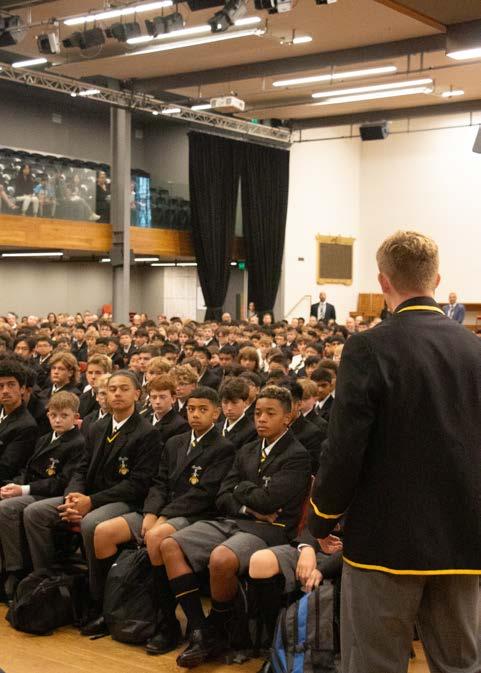
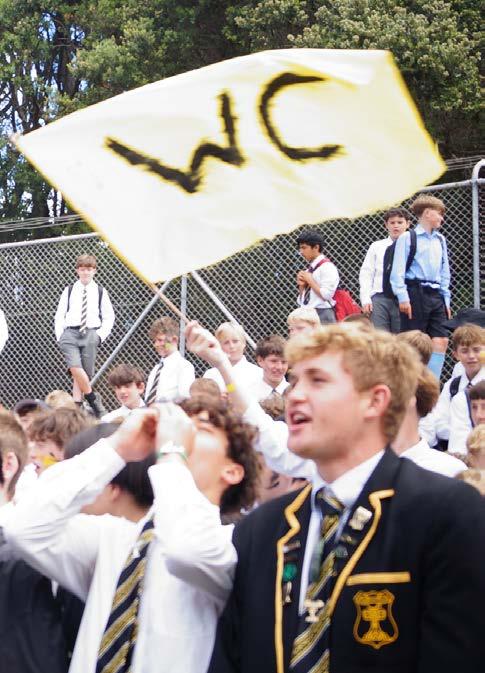
c Ollie leads the supporters with the Wellington College McEvedy chants.
h Welcoming the new Y9 students and their families on their first day at Wellington College.
combined WC-WGC Choir, are currently preparing for the Big Sing, the National Choir Competition.
This year is the 140th match between the 1st XVs of Wellington College and St Patrick's Town which will be played at home this year. This coincides with WCOB AGM so I hope that I will be able to meet some of you there or keep an eye out for me on the No. 1 (I play in the forwards for the 1st XV). A month later, Quadrangular Tournament will be at Nelson College and I know fellow students would love to see the team have a back-to-back win and retain the title we won last year at home.
We look forward to the rest of a busy year and supporting our other sports codes and arts groups.
I look forward to providing further updates on all that is going on in the school throughout the year. We all greatly appreciate the support that our Old Boy community provides, and hope that we will get the chance to meet during the course of the year.
Kia tau rā kā manaakitaka ki a koutou katoa
Naku noa nei, nā Ollie
Wellington College opened on our current site in 1874. The newly constructed Big School (later called the East School) opened on 17 October 1874, built for £10,000 with a roll of 60 students.
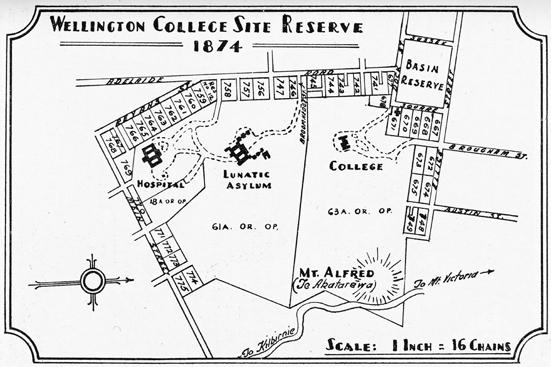
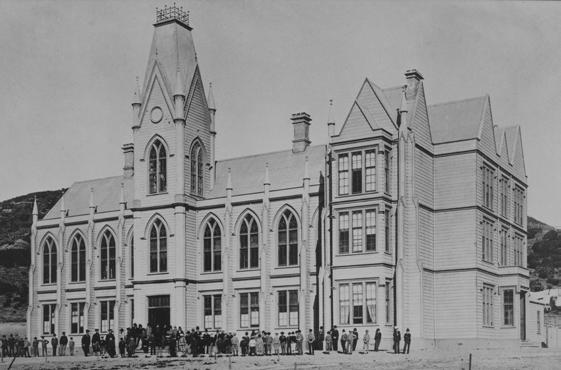
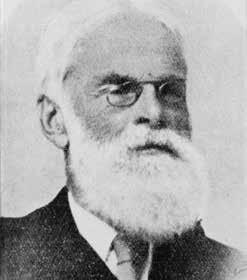
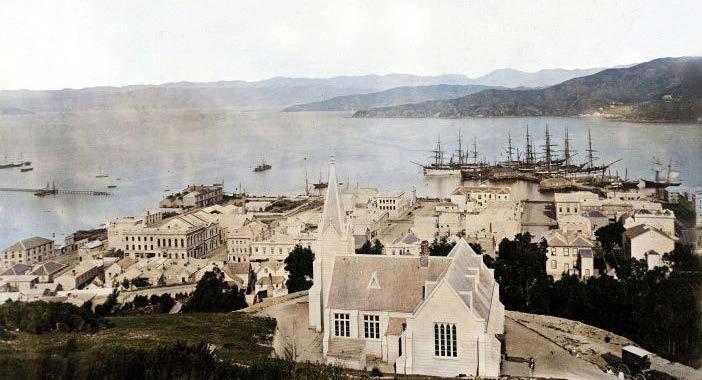

ei Walter Turnbull, father of Alexander Turnbull Library) donated £1000 for scholarships, known today as the Turnbull Scholarships.
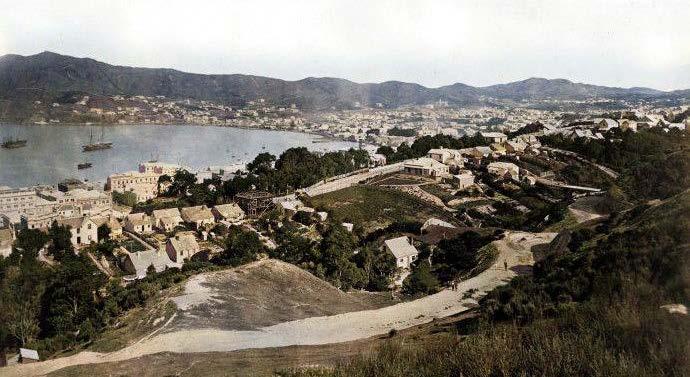
JUBILEE CELEBRATIONS: In 1924, the school celebrated its 50th Jubilee on our present site. The occasion was celebrated with a week of activities and the opening of five new buildings. Firth House, Firth Dining Hall, the Pavilion, the Gifford Observatory and the Headmaster’s House



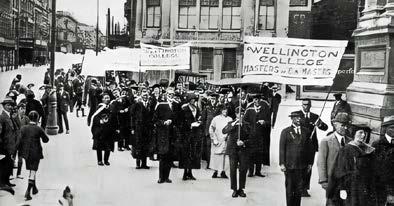
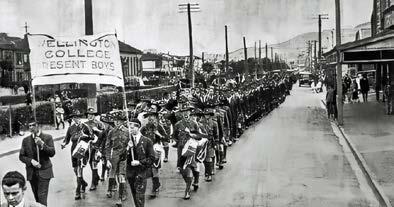
The
Wellingtonian editorial noted The greatness
the
and

Our 2023 Lampstand included an article describing the event held at Karori’s Ben Burn Park commemorating the training there in 1899 of the First Contingent to the Boer War. Several Wellington College Old Boys were numbered in this contingent. Subsequently, we were contacted by Old Boy, Charles Fordham (Class of 1963), the great nephew of Old Boy Alfred Fordham who had featured in the article.
In March, Charles and his family, including sons Scott (Class of 1992) and Robert (Class of 1995) visited the Archives where they were interested to see the Oscar and Victor Gallie display. Charles also being a first cousin (twice removed) of the Gallie brothers. It was interesting to reveal the relationship between the Fordham and Gallie Families.
Iknew the Fordham and Gallie families were somehow connected, but, until the link was confirmed by College Archivist Mike Pallin, I had no idea that Trooper Fordham (Albert Fordham – my grandfather’s brother) and the Gallie heroes, Oscar and Victor, were first cousins.
The link was first highlighted for me when the stories recording their military contributions appeared in the Lampstand (issue 33, December 2023).
Correspondence with Mike revealed his belief that our family comprised the last living descendants with the Gallies – an honour bringing with it a commitment to better reflect the College motto: Lumen accipe et imperti – Receive the light and pass it on.
I wondered too at Lest we forget, marvelling, as a family, at how much we had forgotten or, nowadays, simply didn’t know.
Our families were first linked when our great grandmothers, the Buttars sisters, Margaret and Mary (Gallie) married their respective husbands. This joined the Fordham and Gallie families through the maternal line.
Not long thereafter, as first cousins, Trooper Albert Fordham and Captains Oscar and Victor Gallie came into being,
The Lampstand coverage intrigued me but so did other details that research of our whakapapa triggered, causing me to take a closer look at a number of contemporary newspapers.
On their return from German Samoa in 1915 after eight months service, lack of activity by the New Zealand authorities to join the European War effort totally under-whelmed the Gallie brothers.

of the family), and Bonnie, Charles’ wife.
Independently they met their own costs to travel to the UK and obtain commissions with the Royal Field Artillery (RFA).
In separate units, they were soon in the thick of it, with both awarded the Military Cross (MC) for conspicuous bravery and devotion to duty, with Oscar described …as the hero of all the subalterns, with …all the men of the brigade devoted to him. Victor gained a noteworthy distinction with his award by France of a Croix de Guerre – the French equivalent of an MC.
Oscar was killed at Ypres on 7 December, 1917 when a high explosive shell detonated near his pill box, dying literally on his feet.
Almost seven months later, the Dominion newspaper quoted the CO of the 156th Brigade, RFA, as saying he tried to have him awarded the VC after the Zillebeke fighting but the authorities awarded him the DSO.
The significance of this had, however, gained earlier Royal recognition. Oscar as a second lieutenant attended Buckingham Palace to have King George pin to his uniform, the MC and the DSO –the latter an honour usually reserved for great gallantry by majors and colonels rather than more junior officers
The May 17, 1918, newspaper report said of Oscar’s battlefield funeral: They …gave him the greatest sendoff ever shown along the sector. Presumably, with war raging all around, it is hard to imagine so many gathering at such a time. With full military honours, they buried him. Eight black horses drew the gun carriage. Over 180 people were there apart from the battery. The voice of the padre could not be heard and hardly audible were the silver bugles sounding the last post. Even the shots of the firing party sounded very faint.

Charles
Scott
Jacob

n 1887, Charles and Catherine Cathie immigrated to Wellington from Edinburgh. They had eleven children, five of whom were born before their departure by sailing ship. The family settled in Karori and Charles acquired a suit-making business which he renamed Cathie & Sons. They made a variety of men’s clothing including Sincerity Suits and service uniforms. Charles Cathie later became Mayor of Karori and Cathie Crescent is named after him.
College records show that sons Charles, Andrew, William, Arthur and Ronald all attended Wellington College. It seems they had to walk from Karori unless they were lucky enough to catch a lift to the city, there being limited public transport in those days. This was before the Karori tunnels and the Kelburn viaduct were built, so presumably they had to walk via Kelburn and either down the Terrace or the Aro Valley.
Some of the boys ended up working for the family firm and others went into farming and other jobs. So the family became scattered. Only one boy from the next generation attended Wellington College. That was Stuart Cathie, son of Andrew. His son Andrew also attended Wellington College. William’s three sons lived in Hataitai so were out of zone, following the opening of the senior school at Rongotai College. However William's grandson Richard (son of Noel, and now a retired Wellington lawyer) attended, as did his son Andrew (a Wellington-based stock broker). Andrew’s son, Sam Cathie has donned the uniform this year as a Y9 student. Richard’s daughter Jane’s son Jack Park is also at College
Five generations – proudly associated with Wellington College.
Richard Cathie, Class of 1961 | Prefect
Oscar is now buried in Karori Cemetery.
Oscar’s brother, Victor, survived the War but its effects on him were harder to define. He died on 21 July, 1929 with the Evening Star reporting: For the last nine months of his life, he was unable to rise from his bed and in the end, his was a happy release.
The Star reported in 1917, that Victor was
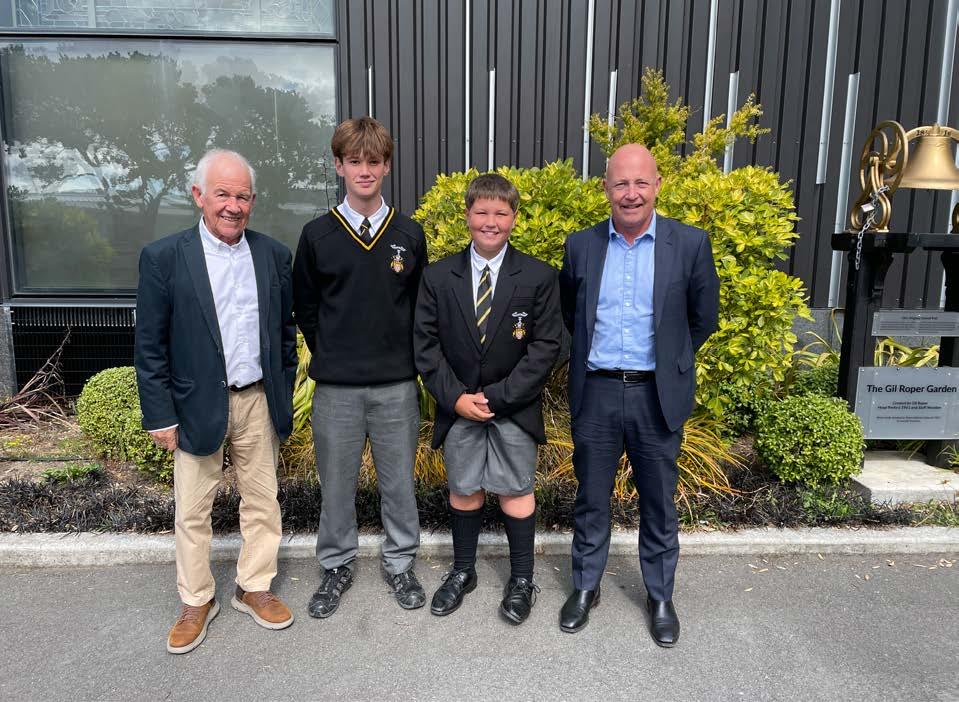

At Wellington College, we are proud that multiple generations of the same families are current or former students.
We are always on the look out for generational family stories to share with our students and Old Boy community. Share your Wellington College family tree with us, and we will share it with our community in our next newsletter. Email: oldboys@wc.school.nz
decorated in the field (at the Somme) with the MC for distinguished service. He was promoted to his lieutenancy and at the end of the same year to his captaincy, gaining the French Croix de Guerre for a notable piece of work in the great retreat of that year. He was only once wounded (in an action near Ypres), and served with the guns up to the moment the Cease Fire was sounded on Armistice Day – souveniring the last two shell cases fired by his battery at 1100
hours, 11 November, 1918.
Our family – myself, wife Bonnie, and sons Scott (accompanied by his son, Will) and Robert greatly appreciated visiting Wellington College with Mike Pallin to view the Gallie display in the Archives and to thank Steph Kane in bringing to life the Memory of Oscar and Victor Gallie. Our privilege too, to meet Old Boys' President Ted Thomas. Charles Fordham
Since we returned to work in mid-January, we have been very busy with numerous visitors to the Archives, undertaken research enquiries, hosted the 2024 Prefects, all while working on new displays for the school and the Archives. I have also been working on a new database for Old Boys who served in the South African (Boer War) 1899-1902 and Old Boys who died in World War II have also been completed. Work is also in progress on a database of those who served in the Vietnam War, with a list included in this eNewsletter for feedback.
To commemorate the opening of the College on our current site in 1874, we prepared a display board, similar to the layout on the opposite page which is presently on show in the College's Girvan Library.
Last year, we reported on Remembering Oscar and Victor Gallie, and arranging to have their medals that were stolen from the College in 1983 replicated. The replicated medals have now been incorporated into a display in the Archives Museum. In March, Old Boys James Griffiths (Geneva) and Michael Simpson (Wellington) (both Class of 1975, and keen numismatists) came to visit us in the Archives and see the new display. James kindly met half the costs of the replicated medals. Both James and Michael were involved in repairing the original display in 1973.
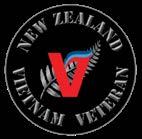
MIKE PALLIN, ARCHIVIST
oldboys@wc.school.nz
THE WELLINGTON COLLEGE ARCHIVES and MUSEUM. Open Mondays and Wednesdays 9.00am- Noon.
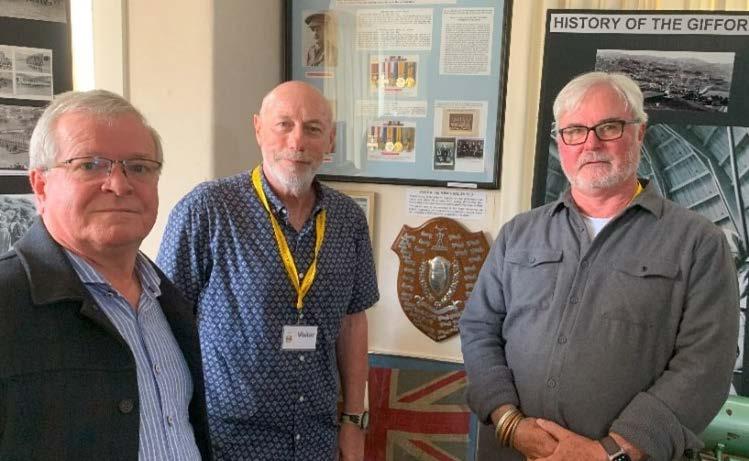
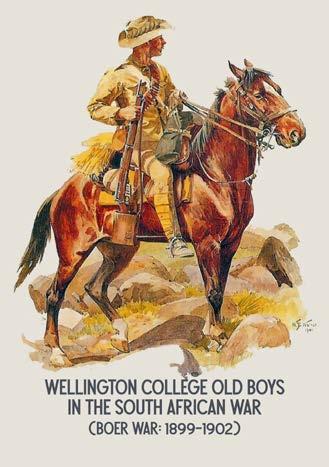
As there was no previous record of our Old Boys who served in the South African War, the Wellingtonians of the period were the only source to be able to collate a (probably still incomplete) list of about 85 Old Boys who served. The booklet provides an account with photos and some stories about those who served. Steph Kane has turned this into a flip book that you can download or read on-line. We always welcome feedback and any amendments you may be aware of. Click HERE for the link.
g OLD BOYS WHO SERVED IN VIETNAM. The following table provides a list based on our search to date. Any feedback on errors and incomplete data would be appreciated. TBC= Requires verification that person listed on Cenotaph site is an Old Boy.

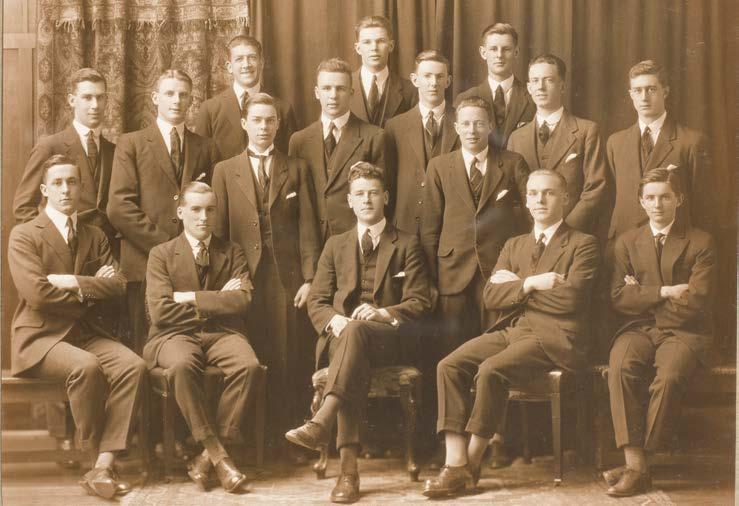
PREFECTS 1924: BACK ROW: NJ Windsor, AG Mitchell, CD MacDonald. SECOND ROW: G McCallum, C A Rushbrook, A C Keys, G S Evatt, D C Ryan, W S Kirk, D J B Halley, H L Grenfell. FRONT ROW: I F Darroch, H C Bailey, F M Hanan (Head Prefect), C D George, J D McFarlane. ABSENT: D G Gray. Allwyn Keys was the Dux in 1924 and, after university, returned to Wellington College in 1927 to teach French. He later became the chair of Modern Languages at Auckland University. Frank Hanan, after finishing university, relocated to Dunedin and worked as a solicitor, becoming involved in local council politics.
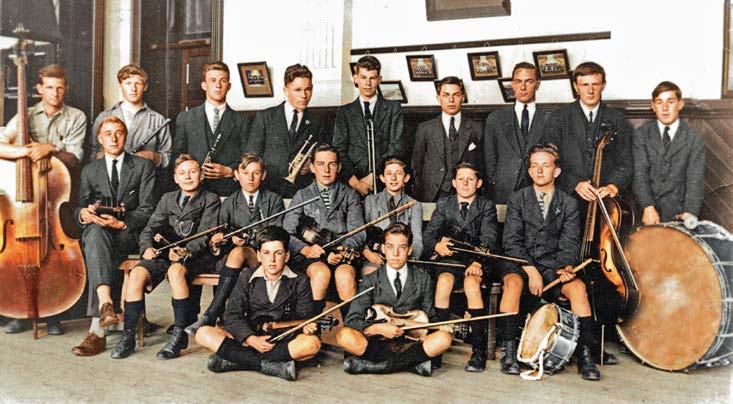
ORCHESTRA 1924: The Orchestra was established in 1923 and its membership increased steadily. Thanks to some financial support from the Activities fund, they were able to purchase some music stands, sheet music and a double bass.
SCHOOL NOTES: School Roll: 830 (of whom 64 were boarders). C H Jenkins (Class of 1923) won the NZ 100 yards at the NZ Athletic Champs. R M Ferkins won the NZ Junior Tennis Champs. The Dramatic Club was introduced. McEvedy Shield Results: 1st Wellington College (92 points), 2nd: Wellington Technical College (22), 3rd: Scots College (20.5), 4th: St Patrick’s College (19) and 5th: Wellesley College (2.5). Quadrangular Final: Wanganui Collegiate 26 - Wellington College 9. Current student K H Clarke, a spectator at the Wellington College v St Patrick’s College collapsed and died on the sidelines. He had suffered from a weak heart for some years and evidently the excitement proved too much for him.

STAFF 1924: BACK ROW: JAG Simpson, PG Thomson, FE Thornton, WFC Balham, HA Heron, WH Nankervis, P Martin-Smith, WJ Perry. SECOND ROW: JT McCaw, MF Turner, HLE Peryman, M Leadbetter, GJ McNaught, J L Dighton, WH Stevens, F Joplin, TE Beard, AS Farquhar, J R Cuddie. Front Row: A Jackson, J N Millard, JS Lomas, W Alexander, HB Tomlinson, T Brodie, TR Cresswell (Headmaster), AC Gifford, FM Renner, J Hall, AE Caddick, HTM Fathers. Heron was appointed as Wellington College’s tenth Headmaster in 1951. Cresswell was Wellington College’s seventh. Renner was appointed as Rongotai College’s first Headmaster in 1928. The prestigious scholarship boards will be appropriately reinstated in our current Hall later this year.
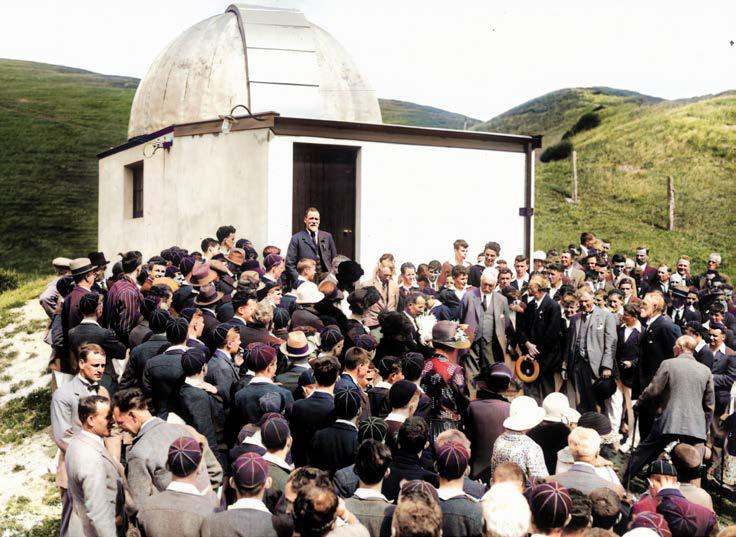
The opening of the second observatory (Gifford Observatory) at Wellington College. The first observatory was built in 1912, but demolished to make way for the building of Wellington East Girls’ College. Master, Charles Gifford stands at the entrance. Date: 1 December, 1924.
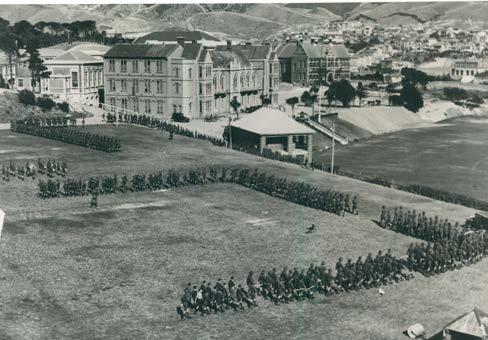

Ross Buddle,(Class of 1963), generously donated a book to Wellington College about the life of Dr Edric Baker, (Class of 1959) who passed away. Dr Baker was an inspiring New Zealand medical doctor who dedicated over 20 years of his life to serving an isolated rural area in northern Bangladesh. His vision of health care for the poor by the poor led to the creation of the Kailakuri Health Centre. Although Dr. Baker passed away in September 2015, the centre continues his work, honouring his legacy. We are sharing the foreword that Ross wrote in the book to our students, hoping it inspires them to strive for the greater good of humanity. The book is available in local bookstores.
Call Me Brother: The Story of a New Zealand Doctor in Bangladesh. Is available HERE in paperback and e-book.
Discover the inspiring story of Edric Baker, a Kiwi doctor who lived in remote, rural Bangladesh and dedicated his life to providing medical care to those in need. His exceptional life has been authored by Kate Day from Christian Advocacy Aotearoa.
During her university years in Christchurch, Kate Day had the opportunity to interview Edric Baker after he spoke at her church. Three years later, Edric passed away and his organisation asked Kate to write his biography. After some nudging from God, Kate said yes and discovered the deep questions that Edric's life posed.
Faith and Service: Edric came to faith in Khandallah Anglican Church and heard Jesus' call to follow. He said yes to that adventure and dedicated his life to serving others. As a young doctor working in Vietnam, Edric saw people die for lack of basic healthcare. This injustice was something he could not tolerate, and he spent his life trying to live out an alternative. The healthcare centre he had grown in the remote Kailakuri village had a team of 90 local people and served 28,000 patients per year. They did so on a shoestring, treating each outpatient for less than two New Zealand dollars and helping diabetics manage their condition for just a few cents per day. This exceptional work led philanthropist Gareth Morgan to call Edric Baker, ‘New Zealand’s Mother Teresa’.
Edric's story is action-packed, set amid war, floods, cholera, and the bleak backdrop of inequality and indifference to suffering. In those contexts, Edric lived incarnationally, training local people to serve their own community as paramedics.
Going 'All In' to Pursue an Ideal: Kate explores the model that Edric brought to fruition in Bangladesh and asks whether it can be replicated. She delves into how Edric sustained himself for so many years despite his failures and flaws. Edric's love in action is a deep challenge to many of us. What if we too refused to accept injustice? Could we go
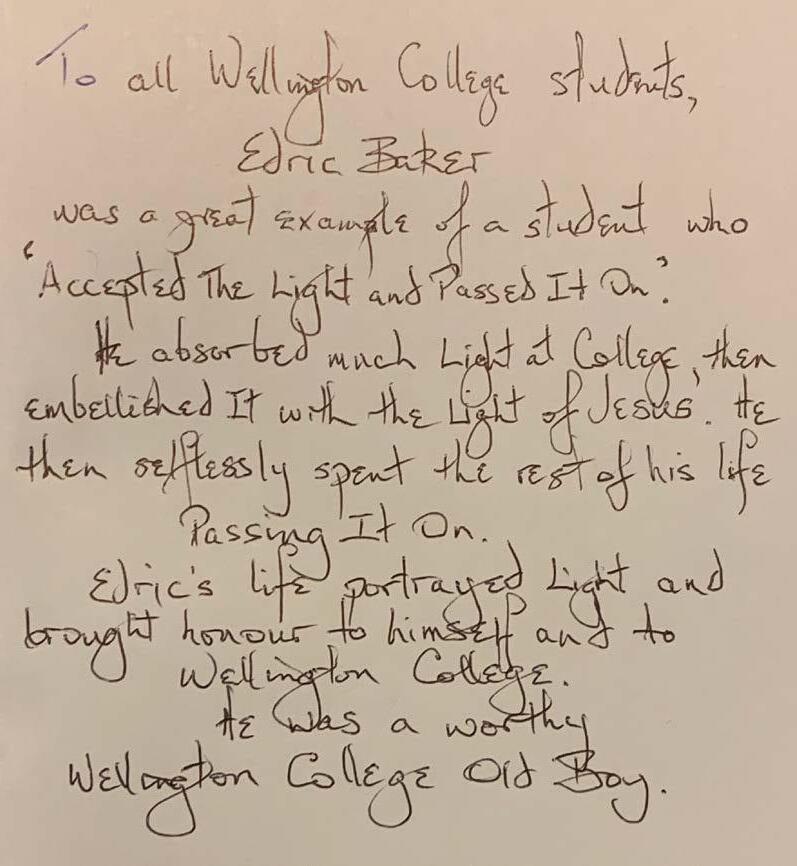
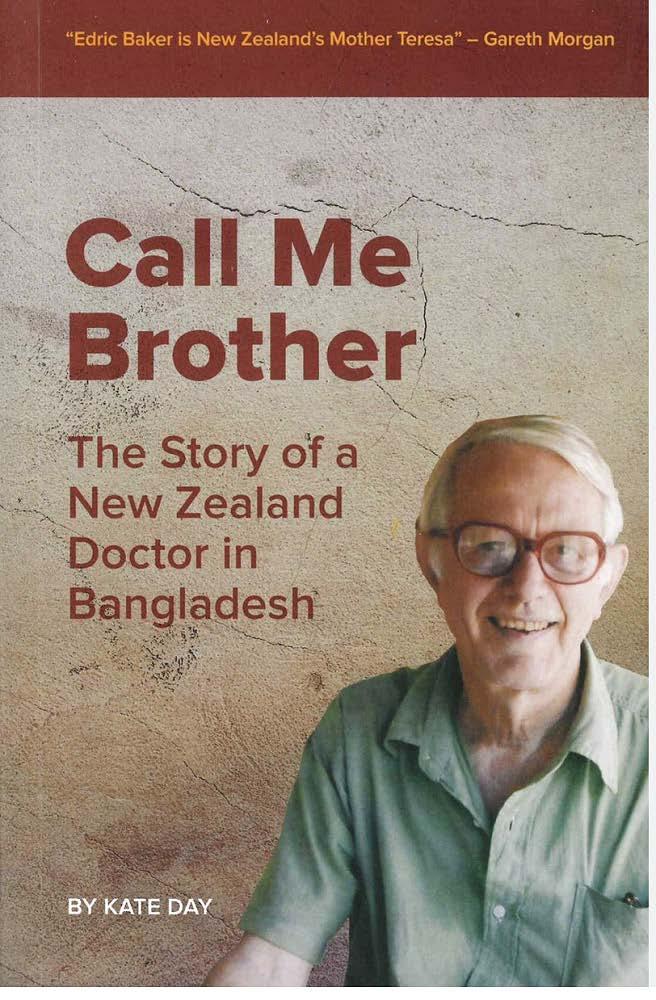

'all in', and sustain it? Edric's story is also an encouragement that ordinary followers of Jesus all have a part to play in transformation, working with Jesus and the resources in our hands.
Don't miss out on this inspiring and thought-provoking read. Get your copy today and join the movement towards living out your faith through service to others. Ross Buddle
Melbourne-based Peter Osvath (Class of 1970), shares with us his story of becoming a World Champion in Fencing - better late than never, he says.
Gladium accipe et imperti
After a year’s fencing, at the end of 1968, Gabor (Class of 1969) convinced his younger brother, Peter to take up Fencing, since he thought it would be useful to have a sparring partner. Peter dutifully started going to Fencing classes at Wellington Girls’ College (there were joint weekly classes there with our sister school, which probably acted as a good recruitment tool).
Thus began a lifelong love affair with Fencing. Peter was worried that, because he was already 15 when he took up Fencing, he had missed the boat, but after more than half a century of active competition, this concern seems somewhat unfounded.
In 1969, Peter won the Gapes Cup, which was contested among the first year Wellington College Fencers (the perpetual trophy may well still be sitting in the Archives), sharpening his appetite for competitive fencing. It also marked the end of Peter’s relatively mediocre hockey career at Wellington College!
scientist in the USA, UK and Australia.
He continued to represent New Zealand internationally, even when he settled in Australia in 1988, adding an Australian National Open Championship to his NZ titles. In parallel to his competitive efforts at numerous World Championships, he forged a career as an International Referee, the highlights of which were being invited to referee at two Olympic Games (1984 and 2000.
Once Peter hit the veteran category, he felt it appropriate to start representing Australia, having lived there for over 25 years. He regularly added Veteran National titles, while stubbornly also persisting with open competitions, simply for the love of it, and for the satisfaction of defeating athletes many decades younger.
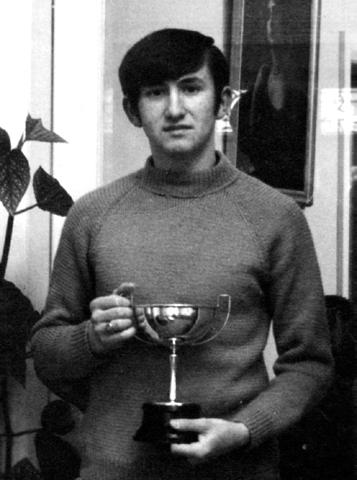
He pursued his passion at Victoria University with some success, winning his first National Open title in 1975, as well as being named Victoria University Sportsperson of the Year in both 1978 and 1980, which was no mean feat against all the high-profile sports at the university. He represented New Zealand at the World University Games in Mexico City in 1979.
Never forgetting his roots, he came back over a number of years, to help with the school’s Fencing Club that had started his journey. While coaching was always secondary to competing, over the decades, he has taught Fencing as he pursued his career as a research
While this sharpened his competitive edge, it also taught him to cope with the inevitable defeat at the hands of the younger faster fencers. To this day he regularly trains with fencers 50 years his junior.
Every year, Peter travels overseas with the Australian team, to compete at the World Veteran Championships, and at the end of 2023, literally days after his 70th birthday, in Florida, he finally achieved every athlete’s dream of being able to call himself World Champion, when he won gold in the 70 and over category, ahead of the top athletes from all round the globe. In a

very emotional moment, his brother Gabor got to see him win the title, the first time he’d seen his young brother fence since Peter won the Gapes Cup at Wellington College all those years ago.
Peter enjoys training and competing regularly with his wife, Evelyn, a dual fencing Olympian and multiple Australian Champion. For the moment, he holds bragging rights, but the mantra in the Osvath family is you’re only as good as your next result so you don’t get to rest on your laurels for more than a fleeting moment.
So what of the future? There is no doubt in Peter’s mind that he will be fencing with intensity and passion for as long as his body can carry him. All thanks to that fateful first fencing lesson at Wellington College.
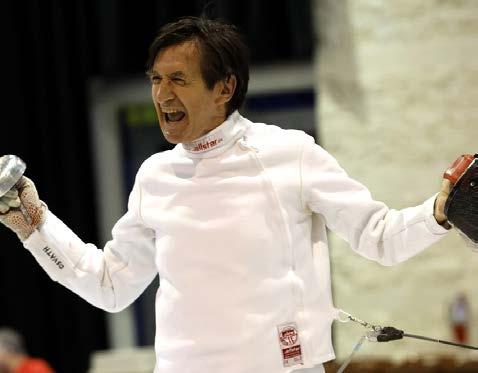
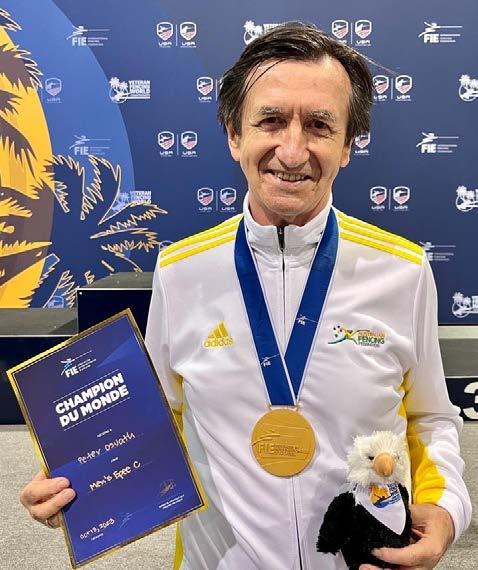
Congratulations to David Grattan (Class of 1981) who is one of 22 Honorary Fellows who have been elected to the Academy of the Royal Society Te Apārangi. Fellowship recognises researchers, scholars, and innovators throughout New Zealand who have achieved excellence in their various disciplines across science, technology, and the humanities.
“
Elected for being a world leader in investigating the actions of the anterior pituitary hormone prolactin on the central nervous system.
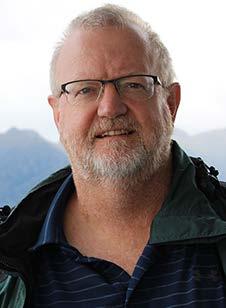
Professor David Grattan is a world leader in the field of neuroendocrinology and is considered the foremost expert investigating the actions on the central nervous system of the anterior pituitary hormone prolactin – a hormone primarily responsible for lactation and breast development. Studies from his laboratory have led the way for understanding prolactin’s actions in the central nervous system. In the past ten years, he has characterised several prolactin-sensitive neuronal networks in the brain, and developed multiple transgenic tools to probe their function. He has pioneered a new understanding of prolactin’s important role in coordinating the adaptations in the maternal brain during pregnancy, and the role of prolactin in promoting parental behaviour in both males and females, contributing multiple high-impact publications. He is regularly invited to deliver keynote addresses and was Editor-in-Chief of the Journal of Neuroendocrinology (2009-2014), the leading specialist international journal in the field.
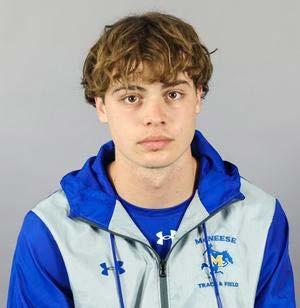
Success in the States sees selection for Fiji
Alex Martin (Class of 2022) has been making significant waves in the USA, in his first year at McNeese State University, Louisiana on a College Athletic Scholarship, with focus on their Country, and Track and Field disciplines. Alex has also been selected for the NZ Team to compete at the Oceania Athletics Championships in June in Fiji in the 800m senior men’s race along with current students; Heath Abbot (U18 Hammer Throw) and Joe Martin (U18 800m).
New Black Cap Tim Robinson (Class of 2019) has a simple approach to batting: I love hitting sixes and trying to entertain people. That attitude has been clear throughout a brief Super Smash career and will now be seen at the international level in this month’s five-match T20 tour to Pakistan.
His ball-striking ability has caught the selectors’ attention while a strikerate of 146 makes him an ideal top-order option when overs are limited. It’s a burgeoning reputation the big-hitting Wellingtonian is happy to embrace. It’s something I dreamed of as a kid — trying to hit sixes in the backyard, Tim said. It’s addicting when you get one right out of the middle and it goes a mile. I take a lot of confidence out of that, but at the same time this is an extremely different challenge and I’m excited to get over there and have a real crack.
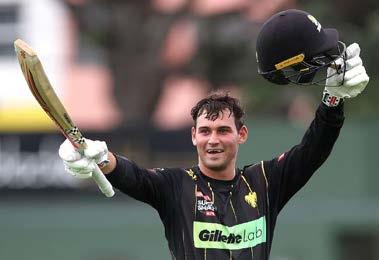

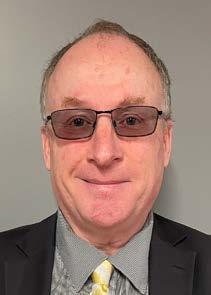
At its 145th Annual General Meeting held in March, the WRFU elected OBA Executive Member, Richard Boag (Class of 1981) as its 219th Vice President. Richard is the Secretary for OBURFC. There have been nine other Old Boys who have been VPs including Alan Wright, Barry Usmar, Richard Waddel, David Waller and Ted Thomas. While not an Old Boy, JP Firth also served as Vice President.
Hopes pinned on being in the NZ U20 Team
Two Old Boys have been named in the New Zealand U20 squad for the inaugural Rugby Championship U20 tournament to be played in Australia next month.
Stanley Solomon (Class of 2022) has been picked in the 31-player squad, Tofuka Paongo (Class of 2021) has been named as non-travelling reserve.
A final squad of 30 for the U20 World Rugby Championship in South Africa will be announced following the Rugby Championship Under 20 tournament.
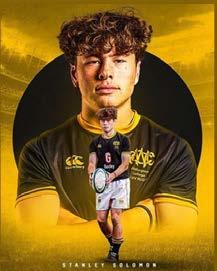
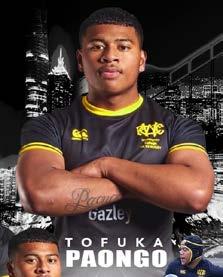
Massey University Palmerston North’s Vice-Chancellor, Professor Jan Thomas has welcomed Alistair Davis ONZM (Class of 1974) into the role as Chancellor of the university. The University Council is the governance body for the university’s operations and provides oversight of the institution and its affairs.
At the recent meeting of the Massey University Council, Alistair was welcomed into the role of Chancellor. He has now begun his position at the helm of our university, Professor Thomas said.
His wealth of experience and commitment to our university is significant and I look forward to working with him over the coming years, she adds.
Alistair has been Massey’s Pro Chancellor since November 2023 and a member of the University Council since 2018. Prior to that he served on the Massey College of Business Advisory Board, which he chaired through until 2015.
Before retiring in 2020, Alister was the Chief Executive Officer of Toyota New Zealand. He joined the company the day after his final university exam in 1979, becoming Toyota’s first graduate to join directly out of university.
He held many roles within the company before becoming CEO in 2008,
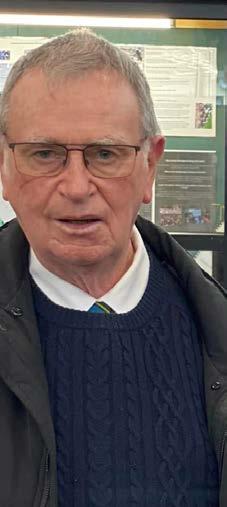

including stints in most parts of the business. He served as Chair of Toyota New Zealand from 2020-2022 and was also a director of Toyota Australia and Toyota Finance. Coincidently, fellow Old Boy, Neeraj Lala (Class of 1992) became CEO following Alister’s retirement.
Alister says it is the Council’s job to balance the interests of students, academics, professional staff, taxpayers, funders, the environment and society. “Some of the Council’s work is the basic administration, financial management and compliance requirements that exist for any large institution, but it also extends to oversight of the more inspirational aspects of a university, including research, our contribution to society, nurturing of students, forging of new paths to obtain education and new ways of teaching, our growing understanding and application of Te Tiriti in the 21st century and so on.”
He would like to see Massey become more resilient and able to operate with less reliance on constrained Government funding, and be able to continue to contribute consistently and mightily to New Zealand. “We are in extremely difficult times, but the university has a variety of plans to respond to these challenges and over time I am confident that we can return to a healthy position. The world, more than ever, requires robust intellectual endeavour to address some hefty challenges, including climate change, the erosion of biodiversity, the malicious use of artificial intelligence and big data, political extremism and racism, inequality and so on. We need to be healthy to be able to contribute meaningfully to these challenges in the context of Aotearoa New Zealand.”
In 2020, Alister was made an Officer of The New Zealand Order of Merit for his services to the motor industry, business and sustainability.
Former Wellington College teacher, Bruce Cockburn, (who still lives at home), celebrated his 90th birthday in March 2024. He was a Master from 1957-1963, following which he spent most of his later teaching career at Rongotai College. He was mostly a form master for ShA classes, and was a teacher of general science, maths, and chemistry, particularly organic chemistry, for which he produced a number of gestetnered notes for his pupils. He coached Hockey, and for several years Master in Charge of Hockey. His interests included photography, classic music, and taking numbers of boys on tramping trips, especially to the Orongorongo Valley, where he had oversight of a private hut, called ‘Boar Inn’.
At the end of my 1963 seventh form year, he wrote in my report, A boy in the upper sixth is under an obligation to justify his position therein. This obligation has been ignored. Further, when we each received back one of our marked term-exam papers he had pointedly enclosed a leaflet entitled A career in BNZ banking. Some of us remember him warmly. Ross Kerr (Class of 1963).
Y13 Student, Ben McGrath was a recipient of the WCOBA Outward Bound Scholarship. Upon his return from his course, he reported back on his experience.
Outward bound is truly an experience of a lifetime. I have developed some relationships and friendships that will last for a long time. From running a half marathon, sailing in Cook Strait, tramping up mountains and spending three days in the bush by myself, I was pushed physically and mentally, and was given a time to reflect. I have come away with much more confidence in myself and a new perspective on life. The overall experience is hard to break down in some words but Outward Bound was truly amazing experience and I would recommend it to anyone that loves the outdoors and willing to push themselves. Thank you to the OBA for your support.
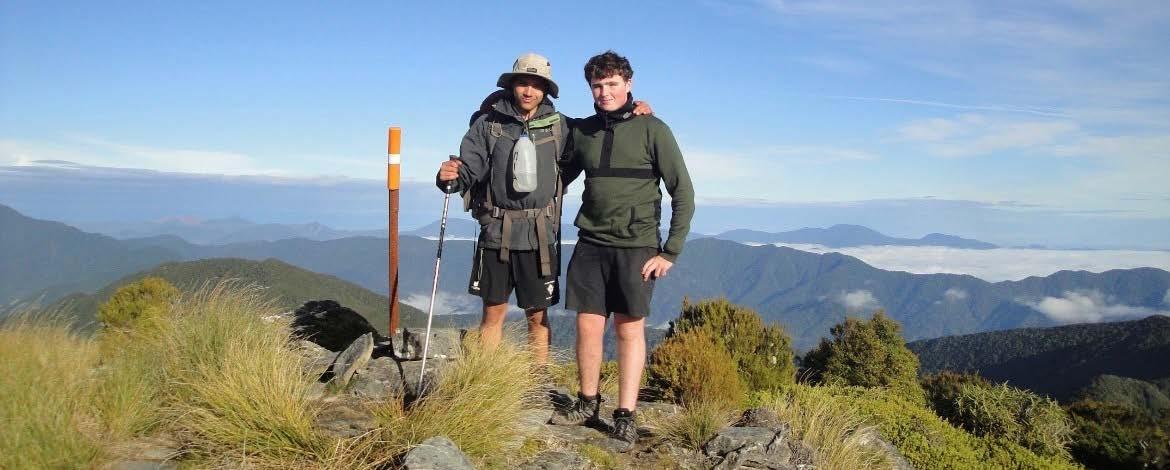
(“Lock it away, Coach!”
Well Deserved... McEvedy Coach and PE Teacher, Mark Tinkle (Class of 2004) enjoys his annual beer with his ol' mate before it gets tucked away in the College's Trophy Cabinet for another year. Mark said ...it was just a small glass as it was a school night and I’m a very serious and professional teacher.
I can’t believe we’ve managed to win this nine times in a row but here we are. I'm super-proud of the athletes and grateful for the coaching crew. If any Old Boys are looking to give back. We’re always on the lookout for anyone with athletics expertise to help bolster the coaching ranks. Drop me a line at m.tinkle@ wc.school.nz
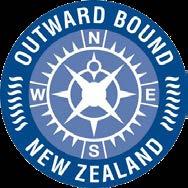

OBA Executive Member, Chris Nicholls has been connecting with Hamish Davidson, the College's Head of Careers and Transition on ways we can work together to assist students with career planning, work experience, mentoring and connecting likeminded Old Boys with students.
The Board has recently approved a new policy for Careers and Transition at Wellington College. This can be viewed on their Careers and Transition Website.
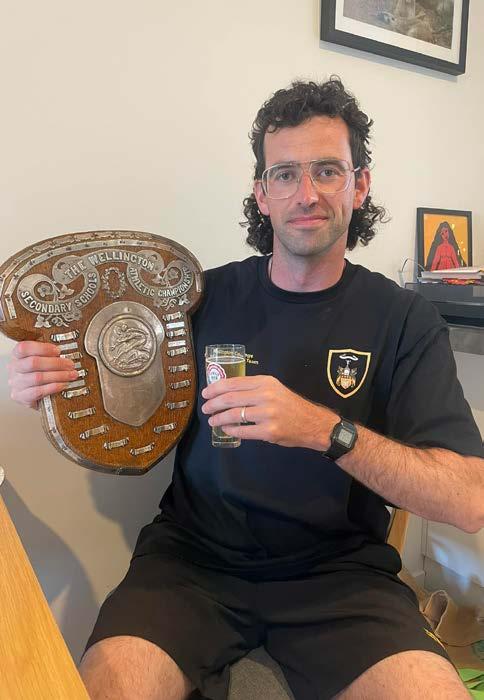
This year’s McEvedy Shield Athletics meeting on 5 March at Newtown Park was the 101st year. Wellington College’s win makes it nine in a row and extends the record for most consecutive victories. Detailed results from the event can be accessed HERE.
In order to meet the workplace related components of the policy the Department has started running lunchtime Futures in....... presentations for students. In Term Two, Hamish will be sharing a link with Old Boys and the wider community for registrations of interest in contributing to the programme whether it be as a mentoring, running a lunchtime presentation, providing work experience or work shadowing or just having a conversation with a student about different career options.
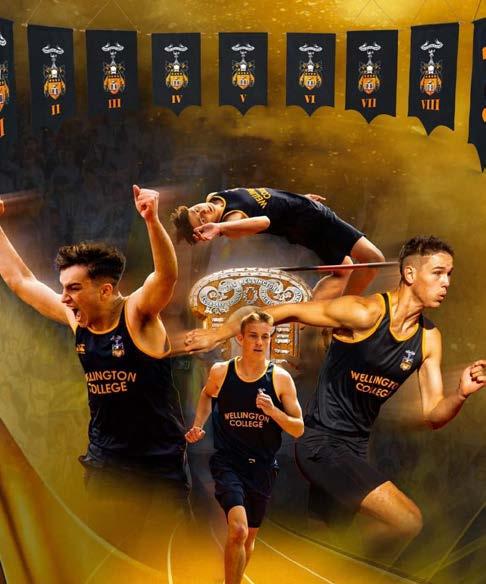
At the end of 2023, two long-serving staff from the Science Department, retired from Wellington College. 2024 HoD of Science, Phil Kendon penned a tribute to them both, which was given at their leaving function.
Sean Hann
Sean retires after 36 years of outstanding service at Wellington College. He began his teaching career with two years at Marlborough Girls’ College, following his teachertraining year. This period of time also saw Sean carry out some ground-breaking research into spiders in his spare time, including the infamous katipo.
Sean joined Wellington College in 1988 as a Science, Biology and Horticulture teacher, not long into Harvey ReesThomas’ tenure as Headmaster. At the time, there were around 1,200 students at the school, with ten staff teaching Science. Compare that to 1,800 students and 17 Science teachers now. He taught his classes in L3, which is one of a number of labs that are still in the same condition 36 years later.
As a Learning Area Leader of Science for many of those 36 years, Sean has demonstrated extraordinary dedication. He has led by example, writing many teaching schemes for staff to follow, and meanwhile teaching his classes in an engaging and informative way. His sharp intellect and interest in both biological issues and advances in pedagogical techniques have inspired a generation of science students and teachers alike.
Sean’s dry sense of humour has never been far from the surface. One student commented on his technique of teaching how barnacles feed, by climbing on a table, lying on his back and waving his arms and legs in the air. Students also commented on his dedication… he was an incredible teacher…. Always helped me to strive to be the best I could be. Easily one of the best teachers I’ve had for a subject. Mr Hann is a great teacher because he doesn’t beat around the bush, he tells you how it is and how you can improve.
youngsters how it’s done, including in 2023 when he scored the winning goal. He has always supported students in extra-curricular Science-related activities including the Australasian (now ICAS) Science Competition, the Rotary Science Forum and the NIWA Science Fair.
We wish Sean all the very best in his retirement. There’s little doubt it will be an active one. With an extraordinary array of interests in sports, music, classics, art, gardening and of course all things scientific, I’m not sure there will be much time for any relief teaching in the mix. All the best Sean and thanks for an epic 36 years of dedication to Wellington College.
of his schooling. He completed a BSc and a PhD, before starting his teaching career. Hamid then taught in Leeds for a number of years. He had a couple of years in Cape Town and on the island of St. Helena in the middle of the Atlantic Ocean, where he was working as a Science education advisor on behalf of the UK government.
Hamid moved with his family to New Zealand in 2005 and taught at Tauponui-a-Tia College before being appointed as a Physics and Science teacher by Roger Moses in 2006.
A highly popular teacher throughout his time at Wellington College, Hamid has been passionate about Physics and has done a fantastic job of inspiring students over the years. He became Head of Department in 2009. Since then, the number of students taking Physics in Y12 and Y13 has been extremely high. Hamid has always focused on encouraging students to see the relevance of Physics to their everyday lives. He also had a number of classic demonstrations up his sleeve, including blowing up capacitors by wiring them backwards in a circuit.
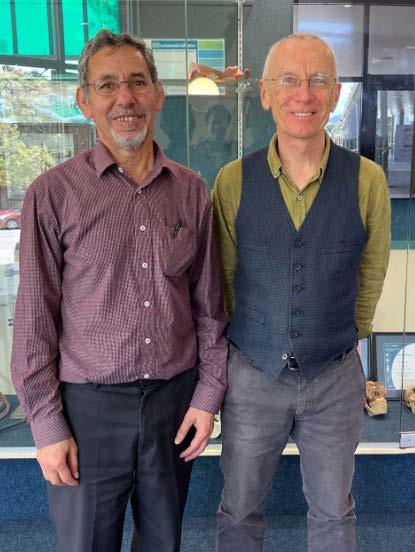
(L-R): Hamid Abu Shanab and Sean Hann
Hamid has been an outstanding Physics teacher at Wellington College for the last 18 years.
Sean was a regular in the staff versus students annual football match. On several occasions, he would show the
Hamid grew up in Palestine. He gained a scholarship to study at Leeds University in England, and moved there at the end
Hamid has always given capable Physics students a nudge to take that extra step of attempting the highlychallenging NZ Scholarship exam each year. For many years, a good number of students have successfully passed this exam, - an extraordinary success rate. This has come down to Hamid’s expert tuition and insight into how to support students to achieve to this highest level.
The Science Department staff will miss Hamid’s cheerful, thoughtful persona, his warmth, ever-present smile and great sense of humour. We wish him all the best in his very well-deserved retirement.

The chance to study at Columbia University in New York is the realisation of many Kiwi kids’ dreams of studying at Hogwarts, says Wellington College’s 2023 Head Prefect.
Later in 2024, 17-year-old Tai Renner will begin his undergraduate degree at the Ivy League university, studying Political Science and Economics, and rowing on the university’s top team.
Tai (Ngāti Kahungunu ki Wairoa, Ngāti Rakaipaaka, Ngāti Matangirau) grew up bilingual in Petone and attributed part of his success to standing strong in his Māoritanga.
Obviously being a young Māori boy from the Hutt it’s hard to imagine yourself at a lead institution like Columbia, he said. The chance to study at an Ivy League university represents the opportunity not only to learn from some of the best educators in the world but to form networks that will last a lifetime.
Tai said his bilingual background gave him a good grounding for when he started at the college where his greatgreat-grandfather was a former Deputy Headmaster. While his mother hadn’t grown up speaking te reo, or closely connected to her Māoritanga, she was of the generation of the Māori renaissance which served as an inspiration during his schooling years. It was a real generational shift for me, my siblings and my cousins to go on that journey ourselves
At Wellington College, Tai enjoyed politics, classical studies, English and te reo Māori, competing in Ngā Manu Kōrero speaking competitions as well as in the school’s rowing team.
Attending an Ivy League college was not something he believed was possible until gaining an outstanding in one of his scholarship papers, along with
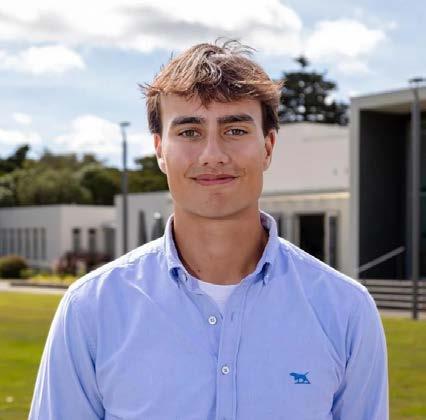
excellence endorsements across NCEA level 1, 2 and 3.That was the major shift in my mind
Tai got the news he had been accepted last month while sitting in the school’s old rowing ute with his childhood coach. He received a notification about an update to his application which, when opened, started playing a huge brass band with a banner of congratulations in white. I was elated. My rowing coach and mates just went nuts. It was pretty surreal
Tai also received a scholarship which will help cover some of the costs, and has guaranteed accommodation for the four-year degree.
He was both grateful and excited for the opportunity, and keen to add his own ‘Māori and New Zealand flavour’ to the university. It’ll be completely different and make me appreciate what we have here in New Zealand as well.
Wellington College Headmaster, Glen Denham said, Tai would be a brilliant ambassador for New Zealand while attending Columbia University. He is the culmination of when outstanding talent meets tremendous work ethic. Our Wellington College community is very proud of him and honoured to be part of his whanau.
Tai will head over in August 2024. Until
then, he’s coaching the rowing team at Wellington College and working at Parliament’s visitors’ centre where he has been for the last two years.
His message to others: The opportunity is there and there are people willing to support you. Tai credited Jamie Beaton of Crimson Education with helping him. The door hasn’t opened for me and been closed. It’s my job to hold the door open with my foot for others to come after.
It’s been almost ten years since Beaton co-founded Crimson Education, and since then they’ve helped thousands of students get into top universities overseas. Tai is going with the wonderful legacy of Māori students going to these schools, the now chief executive said. Though the dream might seem ‘crazy’ or ‘impossible’ to most students, it was possible
Beaton said one of the biggest challenges was distance, which limited exposure to such opportunities. Historically, there had also been a lack of information about the ‘complicated’ application process.
The New Zealand curriculum was also challenging, with Beaton describing NCEA as ‘less vigorous’ than overseas counterparts like A levels, International Baccalaureate or the American Advanced Placement. Finance was less of an issue, though many students used Crimson to help them get scholarships which made it more affordable.
Beaton said Kiwis were attractive, even among the world's best students, describing them as being ‘well rounded’ and ‘natural leaders’. He encouraged students inspired by Tai’s story to start planning as early as 14 to help improve their chances of a successful application, and to take some scholarship courses or some of the more challenging courses on offer The Post, February 2024
Our Dux of 2023 is Henry Isac. Following his outstanding achievements, notably ranking among the top scholars (in the top 10), in the early 2024 assessments, I approached Henry to reflect on his experiences at Wellington College and share his future plans.
• How would you describe your time at Wellington College?
I couldn’t imagine a better high school education than at Wellington College. It was initially daunting in such a vast school but I quickly found myself with friends in my classes, sports teams, and arts groups, and this only strengthened in each successive year. The constant encouragement to achieve was always matched by a supportive and collaborative environment, leading me to more success than I imagined possible walking up the drive as a Y9.
• What is it that drives you to succeed?
Above all, it is enjoyment of the arts, sports, and subjects in which I succeed, and a desire to always learn more and improve my skills. At Wellington College, however, it also became a matter of pride, and achieving my best was always a way of demonstrating my gratitude and respect for the teachers and peers who helped me along the way.
• What activities have you been involved in and how have your other interests and involvement influenced your learning?
My study has never got in the way of enjoying Wellington College's many extracurricular opportunities. I always found running, both in Cross-Country and track, as well as Football and Cricket - key escapes from the stress of learning and academic pursuits.
Debating supported my learning by developing the logical, argumentative, and language skills I deployed in English and History. Finally, it was a huge privilege to take on a leadership role as the head of the Peer Tutoring system in 2023, where I could use some of my knowledge and expertise to support the learning of others, and where I gained a much deeper understanding myself over the course of the year of different study techniques students employ and when each are most effective.

• Who have been your biggest influences and role models during your time at Wellington College - is there a particular teacher that made an impact on your subject choices?
Sitting in a Scholar’s Assembly as a junior student to the school, I saw Nicholas Patel and Liam Anderson receive Premier Scholar awards. From that point, I had success at Scholarship level in my sights. The journey to achieving that would not have been possible without outstanding teachers like Ms Cushla Thomson, Mr Phil Kendon and Mr James Bruce, Dr Hamid Abu-Shanab, Mr Darrell Harvey, Mr Bob Mason and many others who have helped write the recent chapters of the Wellington College success story.
• Proudest moment at Wellington College?
While being named Dux of the school was my greatest personal achievement, being a part of the McEvedy Shield team and winning in all five years I spent at the College was a particularly gratifying highlight of my time at Wellington College.
• What are your future plans - short term and long term?
I am currently studying Physics, Maths, and Economics at the University of Auckland, and I am determined to pursue postgraduate study at a top global university in whichever field I enjoy and succeed in most over the next four years
• Did you receive any external scholarships to help with study or career path?
I have received a Top Achievers Scholarship to the University of Auckland, as well as obtaining a Premier Scholar Award from NZQA, which combined will propel me through the bulk of undergraduate study.
• What advice would you like to pass on to other students?
Believe that you can succeed, not just in what you think of as your “thing”, but every area of your learning, sports, and arts engagement. Wellington College can offer everything, through our great teachers and exceptional student body.
You will surprise yourself with how far you go when trying something new, and be surprised by the unexpected ways fresh activities and subjects develop your existing proficiencies.
2019 u u First in Y9
2020 u u u
2021 u u u
2022 u u u u u u u u
First in Y9 History
First in Y10
First in Y10 Commerce
First in Y10 Latin
First Equal Y11
First in Cambridge Maths
First in Latin
First in Y12
Outstanding NZ Scholarship in Chemistry and Statistics
NZ Scholarship in Calculus
First in Y13 Chemistry
First in Y12 English
First in Y12 History
First in Y12 Latin
First in Y13 Physics
2023 u u u Outstanding Scholarship in Chemistry, History, Physics and Statistics
Scholarship in Calculus, Classical Studies, English
2023 Premier Award Winner
(Top 10 in New Zealand)

A New Look: A new school year means new beginnings, new adventures, new friendships, and new challenges. The slate is clean and anything can happen.
Our new Y9 students (Class of 2028) started at Wellington College late January, and with that created history by wearing the refreshed uniform introduced this year. Y9 students will now wear blazer, shirt and tie, with the option of shorts or trousers. Other cohorts can also wear the refreshed uniform if they wish, until the uniform is phased through each year group.
Headmaster, Glen Denham said, The change will lead to a greater pride in the way we look and give our entire community a huge lift.
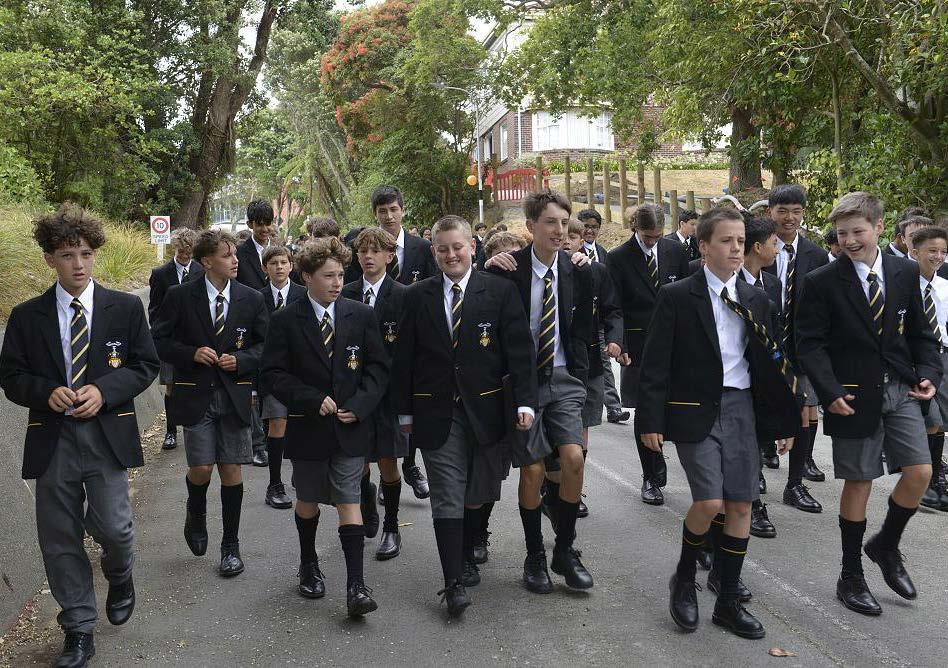
National Champions:
Wellington College went through unbeaten in five matches to earn themselves the title of Junior Secondary School Boys’ Cricket Champions for 2024. Wellington College proved themselves as the form team all week, led by batter Zac Ismail-Sanders and the pace bowling duo of Xavier James and Yusuf Quazi.
Lakeside Support: A number of Old Boys have been out supporting our teams around New Zealand during Summer Tournament Week.
Among them was Gavin Jack (Head Prefect, 1963),who came to support our rowers at the Maadi Cup Lake Ruantaniwha. With Jack is Ben Humphries (L) and Fraser Lindsay (R).


Zac finished as fourth highest tournament run scorer with 141 runs, while Yusuf (eleven wickets) and Xavier (ten wickets) and finished as second and third top wicket-takers respectively.
A pivotal round three match up saw the two unbeaten teams - Wellington College and Hamilton Boys’ High School –come head-to-head, with the winner holding pole position heading into the final two rounds. The game turned out to be
one to remember – the Wellingtonians escaping with a famous onewicket victory thanks to some gutsy lower-order contributions with the bat. HBHS put together an impressive campaign, their only loss coming to eventual winners Wellington.
Auckland Grammar School and Christchurch Boys’ High School met in a final round thriller, AGS coming up trumps and finishing in third place. AGS proved their talent throughout the tournament, picking up big victories over Whanganui Collegiate, Waitaki Boys' High School and CBHS. CBHS also showed their wares, claiming two big victories, and pushing Auckland Grammar right to the wire.
Whanganui Collegiate School finished in fifth place and could be considered unlucky to fall short in two agonisingly close matches against AGS and CBHS.
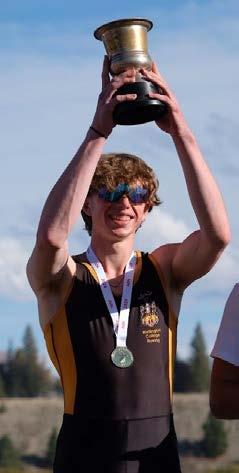
Golden Glory: Harry Kavanagh having qualified for the U16 single sculls final with the fastest time, won the final. This was a fantastic result for a young rower with great potential and subsequently has been nominated as a North Island U18 trialist.
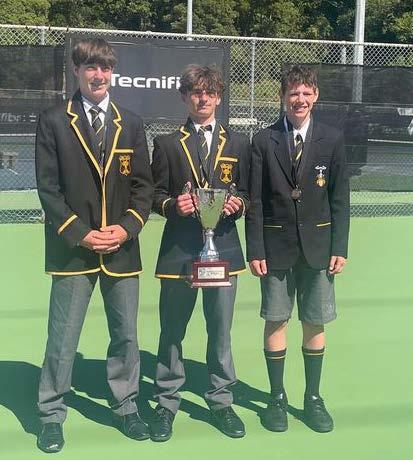
NZ Tennis Title: Wellington College's A Tennis Team won the NZSS Tennis Cup. Competing at the Renouf Tennis Centre in Wellington, the Premier A team of George Lyons, Jeremy Guy and Ethan Pryor were crowned champions. They went through undefeated beating Lindisfarne School, Christ’s College, Francis Douglas Memorial College and HIBS in the final.
This young team bodes well for the NZSS Championships next year.
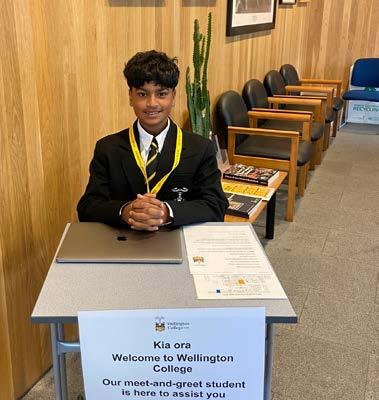

Eastside Education: Bon voyage to our History and Commerce students who are off to the USA for three weeks. After a four-year hiatus of international school trips, this will be an exciting opportunity for our students who will visit a range of sites in New York and Washington DC to enrich their studies. (Yes, they have their number ones for official occasions).
International Science Fair Success:
Congratulations to the 2023 NIWA Wellington Science Fair winner, Jesse Rumball-Smith who placed third in his category at the Taiwan International Science Fair earlier this year!
Jesse produced an interactive phone app that uses audible cues to encourage drivers to slow down and drive safely. He took home an impressive six prizes for his project at the NIWA fair last year.
His success earned him an invitation to represent New Zealand at the Taiwan Science Fair, where he competed against 630 students from over 28 countries. The fair was an incredible experience and hopefully the first of many opportunities to present my research to an international audience. I made friends and connections with students, teachers, and scientists from around the world, said Jesse
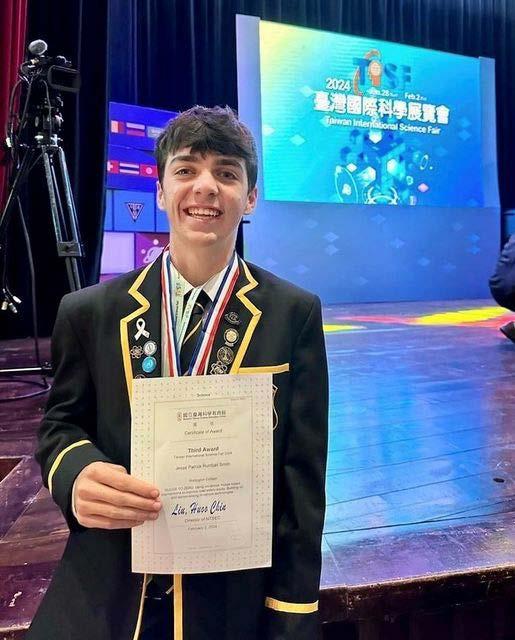
Jesse was also one of only three of the 630 participants to receive a special award. This award invites him to present at the Tunisia International Science Fair later this month, which will host participants from 40 countries and include over 1,500 projects. Awesome work, Jesse. We are excited to see what you do next.
The Prime Minister, the Rt Hon. Christopher Luxon hosted an event on the eve of the New Zealand and Australian cricket test at Premier House. Along with the members of both teams, together with dignitaries from the Australian and New Zealand government, he also invited the Captains from the local secondary schools’ 1st XIs. That line up included Harry Law, who is Wellington College’s Captain. In true friendly rivalry, the game was declared a draw.
i Welcome: At Wellington College we foster the values of manaakitanga and servant leadership. Here is Ethan, ready to greet and assist any visitors to the College as part of a trial. Each day, two Y9 students will undertake a shift - one in the morning, and one in the afternoon. We look forward to welcoming you on site!

Wellington College’s HOD History and Learning Area Leader for Social Sciences, Stephen Tester found time in between teaching to write his debut novel ‘Kiss of Death’.
Be careful what you wish for… It’s 1918, in a Wellington that few people would recognise today, and two major events are about to collide: the signing of the Armistice to end World War I, and the soldier-borne plague we now call the Spanish flu. Into this comes Wellington's only female lawyer, Lorna McDougal, leading her group of Sapphist friends as they attempt to strike a blow for women’s freedom. They go head-tohead with the authorities while she finds herself acting as Crown prosecutor in the case of a wealthy socialite’s ‘murder’ of her husband by kissing him.
As the pandemic cuts a swathe through the Wellington legal profession, Lorna McDougal is one of the few lawyers still standing. The Attorney-General appears to have no choice but to swallow his pride and appoint a woman as Crown prosecutor in the resultant murder trial. Lorna relishes the chance to prove what a ‘mere woman’ is capable of, but her life is thrown into chaos when her sapphist (lesbian) friends are subjected to a homophobic private prosecution.
Meanwhile, the Law Society take umbrage at her new status and redouble their efforts to cull the only woman in their ranks. Lorna must save her friends, find justice for a murder victim, and earn the respect of a hostile profession. This powerful, hilarious, and evocative portrait of life in Edwardian New Zealand is the work of a barrister turned history teacher and will take the reader on an unforgettable journey.
Wellington College gets a mention in the novel because the West School and gymnasium were used as a temporary influenza hospital during the 1918 pandemic. The school had 105 beds and 70 patients died on site.
Stephen has spent most of his life in the Wellington region. He practised criminal law for four years before deciding that teaching history to our nation’s millennials might involve a similar amount of legalistic argument with fewer visits to prison. Seventeen years later, he’s still teaching and has never looked back.
When he’s not writing novels or bingewatching TV shows, he enjoys lying on his couch with a good history book and calling it ‘work’. There’s more about Stephen and Kiss of Death at https:// www.stephenmtester.com/
Buy HERE. https://heritagepress.nz/ product/kiss-of-death/ RRP: $34.99, publishing 14 March 2024
ISBN: 978-1-99116301-1
Format: 235 x 153mm (portrait), 272 pages, paperback.
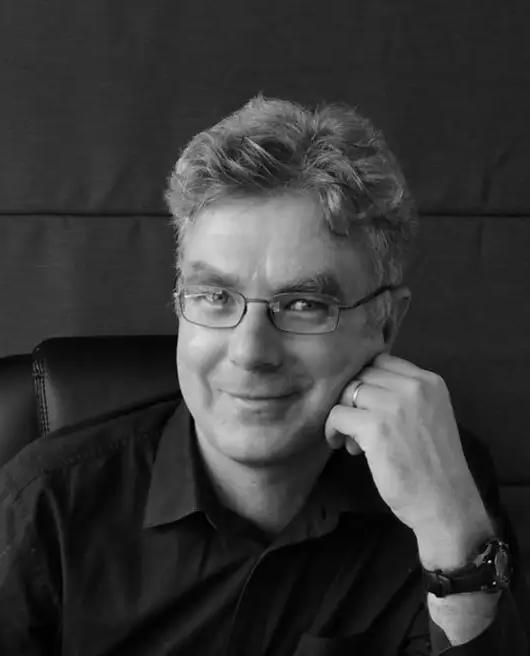

Thrilling victory for the Letica Cup Wellington College won the Steve Letica Cup match on the Artificial Turf on 22 March. The game was played in four quarters, with the first two quarters focused on offensive and defensive play starting from the 22-yard line. The final score was determined in the last two quarters, which followed traditional rugby rules.
OBU scored the first try but missed the conversion, leading 5-0. Wellington College then scored three tries, bringing the score to 19-5. OBU made a comeback with a converted try, closing the gap to 12-19. At full time, OBU scored another try, but missed the conversion, ending the match at 17-19 in favour of Wellington College.
The Steve Letica Cup has been played for 57 years since 1967. Wellington College has won it 37 times, while WCOB/OBU has won 19 times with one draw. This year's win breaks OBU's fiveyear winning streak. Wellington College did not play any 2023 1st XV players due to other commitments.
The 'Man of the Match' award, known as the Calvin Wright Cup, has been awarded since 1978. The 2024 recipient was the No 13 centre, a lightning-fast player.
Flying in from Brisbane, Mark Letica (Class of 1993), nephew of Steve Letica (Class of 1964), presented the trophy, accompanied by his wife and his mother Raewyn Letica, who was also present.
Football appointments
Kale Herbert (Class of 2010) returns to lead Miramar Rangers’ coaching staff for new season.
He will continue as the Director of Football and as the senior men’s head coach for the 2024 season as well as developing the recently established Miramar Rangers Football Academy.
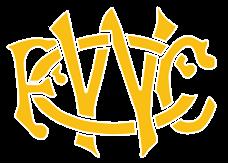
August TBC (R9)
Saturday, 10 August Semi
August
Saturday, 24 August Hurricanes
Saturday, 31 August Hurricanes

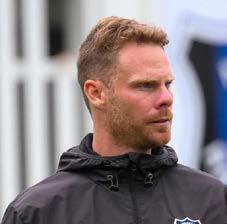
Stu Widdowsøn has been appointed the full-time Director of Football at Wellington College. He moves into the newly-created position after a series of coaching and team management roles at Miramar Rangers and national league side Team Wellington.
The former head coach of Hamilton Wanderers joined Miramar in 2022, as an assistant coach.
Announcing the appointment, Headmaster Glen Denham said: Stu’s coaching credentials and successes are outstanding. He is an inspirational coach who has shown incredible commitment
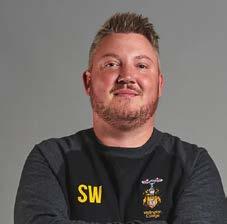
and service to football, not only at Wellington College but throughout the region. Over my career both as a school leader and in sport, Stu is undoubtedly one of the very best coaches I have ever seen. His communication skills, his tactical knowledge and his complete commitment to making our boys not only better footballers but better people are second to none.
The school says it created the role to oversee all its teams and players, after Football had become its most popular sport.
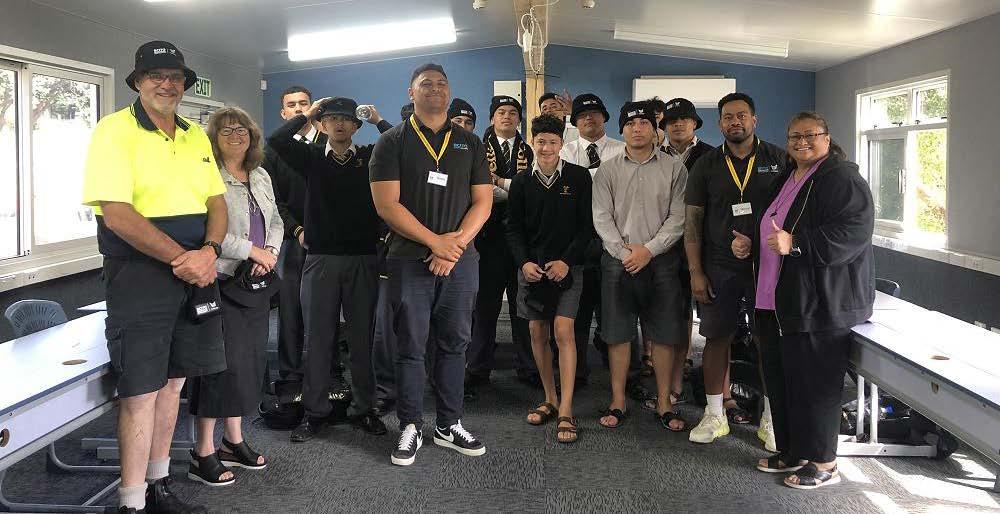
Chatting about Construction: We were lucky enough to have a visit from Old Boys, Ili Tugaga (Class of 2007) and Jese Vatucicila (Class of 2003) to talk to our Pasifka students about career opportunities in the construction sector. Ili and Jese currently work for BCITO as training supervisors and their role involves working with apprentices to complete their training. Pasifika students in senior Materials Technology and Construction courses came along and listened to Ili and Jese’s career stories. It was great for the students to hear real life experiences and have an opportunity to ask questions. Many are considering this as a career pathway.
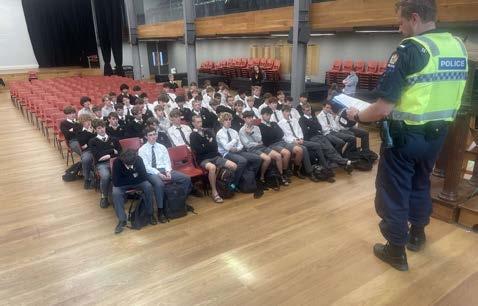
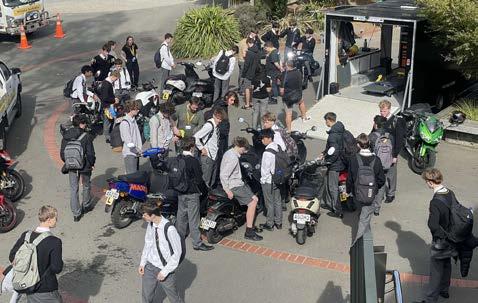
Ensuring our students are Roadsafe: The Wellington City Council, in collaboration with ACC, NZ Police, and the Motorcycle Collective, hosted a workshop for Wellington College students who ride and park a moped or motorcycle at school. This was the first-ever workshop of its kind, providing students with an opportunity to learn about road safety, bike maintenance, and Ride Forever courses.
The workshop started with a motivational speech from the NZ police about the importance of road safety. The students learned about defensive driving and the consequences of not following traffic laws. Later, a guest speaker from ACC spoke about the Ride Forever Courses, which help riders fast-track their licence from learner to restricted to full licence.
The students then gathered outside with members of the Motorcycle Collective, who went over basic bike maintenance and provided some advice. Additionally, the students participated in a survey, got their bikes serviced, and were awarded spot prizes. The event ended with a draw for three $100 gift certificates to spend at a local bike shop.
Overall, the students enjoyed learning more about being safe on their bikes and maintaining them. Wellington College was the first to pilot this workshop, so if all goes well, it will become part of the Council's community safety programme with schools and a permanent event in our school calendar.
Aspiring Athletes:
Congratulations to both Heath Abbot and Joe Martin who on the back of stellar seasons have been selected for the NZ U18 team to compete in the 2024 Oceania Athletics Championships in Suva Fiji in June. This Oceania Championship will host the largest Athletics NZ team ever.

Heath is competing in the hammer throw, and Joe in the 800m. Joe’s older brother Alex has also been selected in the senior team also for 800m.
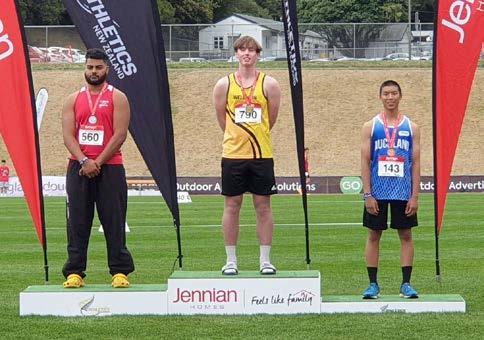
The 2023 Gillette Cup National Tournament took place between the 1722 December in Lincoln. Congratulations to the following teams who competed at the Tournament: Christchurch Boys' High School, Westlake Boys' High School, Palmerston North Boys' High School, Wellington College, Otago Boys' High School, St Peter's Cambridge.
Congratulations to Christchurch Boys’ HS, who went unbeaten through five matches to win the 2023 Gillette Cup. Dylan McArdle was Wellington College’s MVP.
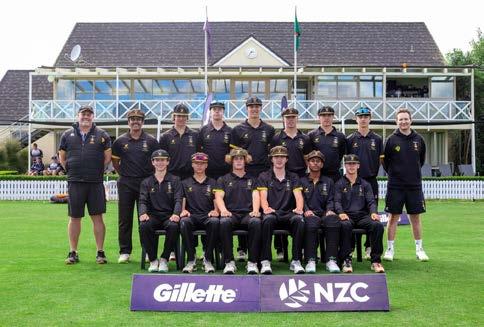
Lighting the Way: You may have seen that we have placed a light above the lamp at the north end of the Tower Block. You will be able to see it at night, from some distance. It's a way of letting people know that we are here and we can help. It's important that we always keep the light on for our boys.
It's okay to be vulnerable and it's okay to cry. As you know our school motto is Lumen Accipe et Imperti - Receive the Light and Pass it on. Light brings clarity and understanding. It brings warmth and comfort and allows us to see what's ahead of us. It illuminates all the things that are with us.
To our boys, no matter where you are or how old you get, in the toughest times, in the darkest moments the light will always be on here for you at Wellington College. Glen Denham, Headmaster

The Senior A Volleyball team played off for fifth and sixth at the NZSS Champs, beating Waimea College 3-2 in a pulsating finale to a great tournament. Best result ever for a Wellington team.
The Junior and Senior Floorball teams both finished fourth in their respective competitions. The Junior and Senior Futsal teams finally finished 18th and 15th respectively in a very strong competition. This result ensures direct qualification for next year which is important.
The Rowers finished at Maadi Cup on the Saturday having made 4 A finals and
Old Boys who wish to enrol their son for Year 9 for 2025 can now apply on line through the out-of-zone enrolment process.
Complete the on-line enrolment form here: https://www.wellington-college.school.nz/enrolment/
This is an opportunity for new students and their families to look around the Wellington College facilities and meet the Senior Leadership Team.
Monday 17 June and Tuesday 18 June 2024 at 9.00am Out-of-zone enrolments for Y9 close on 24 July.
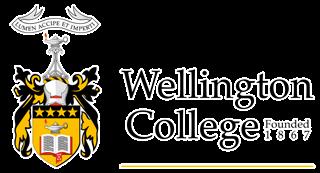

3 B finals. The highlight came at the end of the competition with Harry Kavanagh winning the U16 single sculls final.
The Phillips Cup Golf Finals were held at Boulcott Farm Golf Club this week. WC Red and Gold teams qualified from the Wellington zone to play against Hutt and northern teams.
The Red team of Logan Hopfler and Silas Campbell retained the trophy won last year with Riley Kennedy and Charlie Cornish finishing fourth.
The CSW Regional Athletics Champs were held at Newtown Park with Wellington College athletes featuring well across the events with the following winning gold in their respective events. Leo Yusuf, Senior 100m. Rauri Meo, Senior 200m. Logan Hopfler, Intermediate 1500 & 3000m. Liam Galt, Intermediate 400m. Joe Martin, Senior 400m. Toby Brook, Junior 800m. Alex Macbeth, Intermediate 800m. Regan Kwan, Senior Long Jump & Triple Jump. Tupe Valu, Junior Shot. George Gray, Intermediate Javelin. The Intermediate and Senior Relay teams also took out gold.
Our boys also featured well at NZ Track and Field Champs. The meet began with an impressive Silver Medal to Heath Abbot (Y13) in the U20 Hammer Throw, throwing an age-group up and with a heavier shot. He finished the meet equally well, taking Gold in the U18 competition throwing 60.67m to place
him 28th in the World in 2024.
Fine performances on the track saw Alex Macbeth (Y 10) win Silver in both the U16 800m and 1500m and Joe Martin (Y 12) win Silver in the U18 1500m and Bronze in the 800m.
Leo Yousef Y13) claimed Gold as part of the Wellington 4x100m U20 relay team!
A group of nine students from Wellington College represented at the NISS Mountain Bike Championships in Rotorua. They faced stiff competition but all competed well. Jack Titter finished eighth in the U 16 Cross-Country and Wilbur Weston was 20th in U14 Enduro.
Joel Ball Lahood (Y13) competed in the Junior (U20) Australian and Oceania Fencing Champs in Melbourne, winning four Gold Medals in the individual and teams events.
The Australian and Oceania Junior Fencing Championships are two separate events run in a single competition. Joel won two Golds in the individual Men’s epee for winning both championships and a further two Golds for being part of the NZ Men’s epee team to win the teams event for both championships.
It is with sadness that we inform you of fellow Old Boys and staff who have recently passed away (since our 2023 Lampstand was issued). If available, an obituary for some listed (indicated by an O are included on the following pages. If you would like to notify us of a death, or submit an obituary, please contact: oldboys@wc.school.nz
CLASS OF 1941
O FREEMAN, Allen Tourell
1923 - 2024 Late of Kapiti
Wellington College: 1937 - 1940
NZ41969 Sgt Allen Tourell Freeman, medical section RNZAF WW2 NZ and Pacific.
CLASS OF 1946
DIXON, Raymond (Ray) Thomas
1928 - 2023 Late of Wellington
Wellington College: 1942 - 1946
1st XI Football
O KELLY, Desmond Lance
1928 - 2024 Late of Auckland
Wellington College: 1942 - 1946
Geologist, teacher and actor.
CLASS OF 1947
NICHOLSON, Bryan Osborne QM
1924 - 2024 Late of Auckland
Wellington College: 1943 - 1944
STOKES, Graeme Oliver
1928 - 2023 Late of Auckland
Wellington College: 1943 - 1946
CLASS OF 1948
DONOVAN, Robert Bruce (Bill)
1930 - 2024 Late of Auckland
Wellington College: 1944 - 1947
Firth House
O HARDIE BOYS, Sir Michael, GNZM, GCMG, QSO, KStJ, PC, Governor General 1996-2001
1931 - 2023 Late of Kapiti
Wellington College: 1944 - 1948
Prefect
CLASS OF 1949
TAYLOR, Arthur Charles
1932 - 2024 Late of Waikato
Wellington College: 1945 - 1947
WOOLLEY, Bryan Worth
1931 - 2024 Late of Waikato
Wellington College: 1945 - 1948
CLASS OF 1950
AITKEN, Gerald James
1933 - 2024 Late of Wellington
Wellington College: 1946 - 1951
DODSON, Henry (Harry) Joseph Dwarber
1930 - 2023 Late of Auckland
Wellington College: 1946 - 1948
CLASS OF 1951
McARTHUR, Peter Robbie
1933 - 2024 Late of Auckland
Wellington College: 1947
WARD, John Ingles Hayden
1933 - 2023 Late of Bay of Plenty
Wellington College: 1947 - 1949
CLASS OF 1954
McHALICK, Michael (Mike) Joseph
1937 - 2024 Late of Wellington
Wellington College: 1950 - 1955
1st XV
CLASS OF 1955
WOOLLEY, Charles (Chas) Alexander
1938 - 2023 Late of Bay of Plenty
Wellington College: 1951 - 1953
CLASS OF 1956
O KIDD, Neville Sutcliffe MBE
1939 - 2023 Late of Auckland
Wellington College: 1952 - 1957
Head Prefect, 1957. 1st XV
Retired Lt. LRNZIR, NZSAS Malaya and Vietnam
NALDER, Thomas (Tom) William
1939 - 2024 Late of Kapiti
Wellington College 1952 - 1955
SWITZER, Robert (Bob) Samuel
1939 - 2024 Late of Bay of Plenty
Wellington College: 1952 - 1954
WEARNE, Nicholas (Nick) George
1938 - 2024 Late of Bay of Plenty
Wellington College: 1952 - 1955
CLASS OF 1957
CHILDS, Stanley (Stan) Lochhead
1939 - 2024 Late of Auckland
Wellington College: 1953 - 1956
Firth House, 1st XV
HERCUS, David (Dave) Allan
1939 - 2023 Late of Kapiti
Wellington College: 1953 - 1957
CLASS OF 1958
BOND, Ian Alastair MacKenzie
1940 - 2024 Late of Wairarapa
Wellington College: 1954 - 1955
Firth House
O HAYVICE, Michael Joseph
1940 - 2024 Late of Auckland
Wellington College: 1954 - 1957
CLASS OF 1959
BUCK, Arnold John
1941 - 2024 Late of Wellington
Wellington College: 1955 - 1957
O GAPES, David John ONZM
1942 - 2024 Late of Auckland
Wellington College: 1955 - 1958
O WINGFIELD, Blair Winton MNZM
1941 - 2024 Late of Bay of Plenty
Wellington College: 1955 - 1959
Prefect, 1st XI Cricket, 1st XV Rugby
CLASS OF 1960
EADDY, David Marriott
1942 - 2024 Late of Wellington
Wellington College: 1956 - 1960
O MITCHELL, Ian Balfour
1943 - 2024 Late of Marlborough
Wellington College: 1956 - 1961
Prefect, 1st XI Hockey (Captain)
TAYLOR, Richard Hugh
1943 - 2024 Late of Wellington
Wellington College: 1956 - 1960
1st XI Hockey
CLASS OF 1961
O ALLEN, John Murray
1943 - 2023 Late of Auckland
Wellington College: 1957 - 1961
MILLIGAN, Graham Robert
1944 - 2023 Late of Horowhenua
Wellington College: 1957 - 1960
Firth House
WARNER, Dennis Winston
1942 - 2024 Late of Auckland
Wellington College: 1960 - 1961
CLASS OF 1965
KIRKHAM, Bruce
1947 - 2024 Late of Wellington
Wellington College: 1961 - 1966
PPTA Service Award: Role of Honour 2014

CLASS OF 1966
O JOHNSON, Graham Steuart
1948 - 2023 Late of Auckland
Wellington College: 1962 - 1966
CLASS OF 1967
BUIST, William (Will) Frederick
1950 - 2024 Late of Kapiti
Wellington College: 1963 - 1967
BUTTON, Leslie (Les) Edward
1949 - 2023 Late of Wairarapa
Wellington College: 1963 - 1965
LETICA, Anthony (Tony) Milos QPM
1949 - 2023 Late of Hawkes Bay
Wellington College: 1963 - 1966
Ret. Inspector, NZ Police. The Queen's Police Medal For Distinguished Service 1988.
CLASS OF 1968
SERESIN, Christopher David
1950 - 2024 Late of Wellington
Wellington College: 1964 - 1964
Piano genius, sitar player, and contributor to the musical soundtrack of the counterculture. Band Member with 'Fresh Air', and ‘BLERTA’ to name a few.
CLASS OF 1970 DUDFIELD, Christopher (Chris) John
1953 - 2024 Late of Wellington
Wellington College 1966 - 1970
Studied geology, physics and sociology at Victoria University before obtaining a BAS at Auckland University. Trustee with Terawhiti Licensing Trust. Stood as an Independent in 2022 WCC elections.
CLASS OF 1971
SHIRER, William (Will) Andrew
1954 - 2024 Late of Bay of Plenty
Wellington College: 1967 - 1971
Estate Manager, Kuratau River Wines
CLASS OF 1972
BAYLISS, David Michael
1955 - 2024 Late of Manawatu
Wellington College: 1970 - 1972
CLASS OF 1977
ANDREWS, Lindsay Neal
1958 - 2023 Late of Wellington
Wellington College: 1973 - 1977
CLASS OF 1996
FUIMAONO, Shay Taimua
1979 - 2024 Late of Wellington
Wellington College: 1992 - 1996
CLASS OF 1998
O O'CONNOR, Cameron (Cam)
1981 - 2024 Late of England
Wellington College: 1998
1st XV
STAFF
PIPER, Leon Bremner (Pip)
1924 - 2024 Late of Wellington
Wellington College: 1956.
Taught Chemistry and General Science. WWII Fighter Pilot.
WATTERS, Raymond Frederick PhD
1928 - 2024 Late of Wellington
Wellington College: 1952 - 1953
In 2009, he was honoured with a Distinguished New Zealand Geography Award from Victoria University.
ALLEN FREEMAN
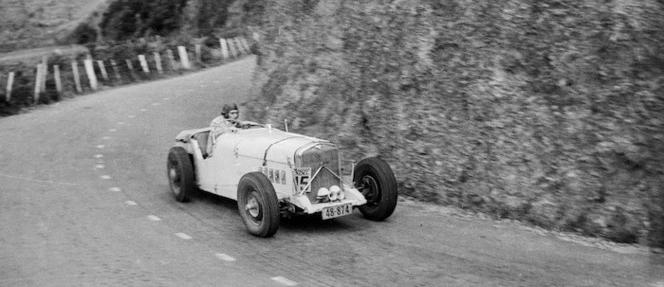

A longtime Kāpiti resident, and more recently, Allen lived in the Charles Fleming Retirement Village in Waikanae, and celebrated his 100th birthday in October among family and friends to spend time with this astute centenarian.
Allen was encouraged by singing and hollering to take a deep breath and blow out his birthday cake candles before they triggered the village smoke alarms.
A dozen large ‘100′ helium balloons and vases of flowers from Allen’s own garden decorated the library where a generous spread was laid out for afternoon tea.
Allen received messages from King Charles, Governor-General Cindy Kiro and the outgoing Prime Minister Chris Hipkins and many others. His Australian nephews put together a fascinating large-screen TV slide-show spanning most of the 100 years of Allen’s life. Born and bred in Wellington, Allen is proud of the service he undertook a few decades later with the NZ Airforce Medical Corp in Guatemala during World War II.
Back in New Zealand, he became heavily involved in everything to do with cars including racing them alongside Brabham, Fangio and Moss in the NZ Grand Prix.
Allen owned and raced a rare Lago-Talbot T26C and until recently owned and drove a beautifully restored vintage Morgan Plus Four.
This is the man Stirling Moss tapped on the shoulder just before the start of the 1961 Grand Prix at Ardmore asking him to pull sharply to the left when the starting flag came down, as he was ‘coming through’, which he most certainly did, moving at speed from a penalty position at the back of the field, into the lead.
Buying and selling cars and racing some of them remained a major interest of Allen’s for decades. In later years he became a stalwart and very active car club member travelling to events throughout New Zealand. NZ Herald.
Desmond brought his distinctive voice and understated acting style to many character roles. Along the way he played many a straight-talking Kiwi: fathers, mechanics, doctors and swagmen among them.

Desmond worked initially as a geologist, then a teacher, a job which took him to Fiji. While lecturing at Wellington Teachers' College in the mid 1970s, he made his stage debut. He argued later that theatre is the place where an actor learns his craft. He was 48. Soon after, Desmond won the first of many professional roles at Downstage Theatre. In 1979, he made his screen debut in movie Sons for the Return Home, directed by Paul Maunder Desmond played a man at a dump. His first few hours on a film set were spent helping the crew empty a sea of blue plastic garbage bags.
In 1980, he got one of his biggest screen roles, in Jocko. Jocko (Bruce Allpress) and China (Desmond) were two swagmen travelling the country, making a barebones living as shearers and labourers. The TV series evoked the bushman myth common to both sides of the Tasman. After rambling by horse in their first season, cost savings in the second saw the duo trapped in the fictional town of Middleborough. Desmond was nominated for a Feltex Award for the role (Allpress took the prize).
Around the same time, Desmond won another front and centre role in Free Enterprise, one of playwright Greg McGee's first television scripts. Produced as part of the Loose Enz series, the teleplay saw Desmond's character, a tramp, facing off against the cantankerous proprietor of a greasy spoon cafe (Kate Harcourt).
In the same period, Desmond did strong work in two of his favourite films: Smash Palace (playing fellow mechanic to Bruno Lawrence's [Class of 1958] character) and Ronald Hugh Morrison's moody coming-of-age tale The Scarecrow (as working class dad to the teen protagonist). He went on to appear in movies Bad Blood and Illustrious Energy, and put his arm up the back end of a cow during an onoff role on TV series Country GP
After working with Pat Robins on short film O'Reilly's Luck, Desmond co-starred in
Robins' 1992 teleplay Matrons of Honour Desmond's character marries a former school colleague (Dorothy McKegg) who is in her 60s - much to the horror of her family. Desmond also played a cantankerous old dad in awardwinning Fiona Samuel short Song of the Siren; father to a runaway bride in romance Absent without Leave; and did two seasons as a grumpy storeman on Market Forces, the sequel to hit TV comedy Gliding On
His work on anthology series The Ray Bradbury Theatre included a key part in episode The Tombstone. Working alongside American talent Shelley Duvall (The Shining), Desmond played landlord of an unusual boarding house. By now he was also making sporadic acting appearances in Australia, including appearances on Water Rats and the Asian-set Embassy
Back home, he acted in Brit-Kiwi fantasy Dark Knight (not to be confused with Christian Bale's Batman films). Acting alongside a rat that was his constant companion, Desmond was Fingal, the tetchy but kind-hearted druid protector to Ivanhoe, the show's hero. Kelly lost out on the chance to star as ageing inventor Burt Munro in The World's Fastest Indian after pressures to cast an actor with international appeal.
Desmond also acted extensively on stage, most often at Downstage in Wellington. In 1996, he was nominated for Chapman Tripp Male Actor of the Year, thanks to acclaimed play Tzigane. The tragicomedy revolves around a Greek-Romanian family living down under.
Desmond — who spent more than a decade living in Australia — also wrote eloquently about photography for Art New Zealand. In 1983, he wrote and presented a series on landscape photography, for arts show Kaleidoscope
Desmond passed away in 4 February, aged. 95. An obituary in The NZ Herald made mention of his humour, intelligence and charm which were present to the very end. He enjoyed a long and creative life encompassing geology, teaching, acting, writing, singing and chocolates. Values Party candidate for Wellington City Council elections in 1974. Elected to Downstage Theatre Trust Board in 1991.
Note: Desmond's extensive screenography sometimes outgrew itself thanks to credits that were not his own — he shared the same name as an Australian-based musician/actor, and a Brit-based dancer. NZ ON SCREEN.
Sir Michael Hardie Boys posed something of a contradiction to those who sought to explain the quietly spoken, respected, decent but decidedly un-flamboyant character who served five years as Governor-General, including through theoretically one of the most constitutionally challenging periods in the country’s modern electoral history.
A gentle man with a privileged background and a social conscience that underpins almost every major speech… This is not a rock-the-boat man, one commentator offered when his term came to an end. Another tried the ‘outspoken’ tag, despite his ‘low-key’ manner, seeking to highlight his willingness to use some of his many speeches in office to lament social and cultural shortcomings facing the nation.
He himself – while he disputed being some kind of shrinking violet – admitted that when he was first asked to take on the vice-regal role in the mid-1990s, his initial reluctance was in part motivated by an element of social awkwardness.
He was in London, fulfilling Privy Council duties as part of his role as a Court of Appeal justice, when then Attorney-General, Paul East asked to meet with him, as Si Michael later recalled in his memoir, The Boy From Evans Bay.
Having hit him up with the entirely unexpected job offer, [East] then gave me a whisky. I needed it, Sir Michael wrote. I said that I did not think I was at all fitted for the role; for one thing, I was not good at small talk.
Obviously he overcame his misgivings; he had been brought up to accept the callings on him, and to willingly rise to the demands made of him.
Michael Boys, as he was initially known, was born in October, 1931, the first of two sons born to Reginald Boys, a lawyer (and subsequently a judge in the equivalent of today’s High Court), and Edith Bennett, known as Nan (a daughter of the founder of Bennetts booksellers). Both were from ‘staunch Methodist stock’, as Sir Michael later recounted in his memoir.
As the title of that book suggested, he spent his youth in Wellington, living at Hataitai, completing his schooling at Wellington College, with the Methodist Church proving a significant influence on his formative years, later extending to the Boys’ Brigade, the Christian youth organisation, which he had a near life-long association with, ultimately as its patron.
He followed his father into the law, enrolling at Victoria University College (then part of the now defunct University of New Zealand) for a double arts and law degree. Graduating in 1953, he joined his father’s firm, Hardie Boys, Scott and Haldane. The memorable double-barrelling of his family name had come about when Reginald set up his own law firm, deciding that ‘Reg Boys’ may not be a compelling enough offering for would-be clients, so presenting himself by his full handle, Reginald Hardie Boys – his middle name, Hardie, eventually becoming adopted as part of the family name, and then down to the next generation.
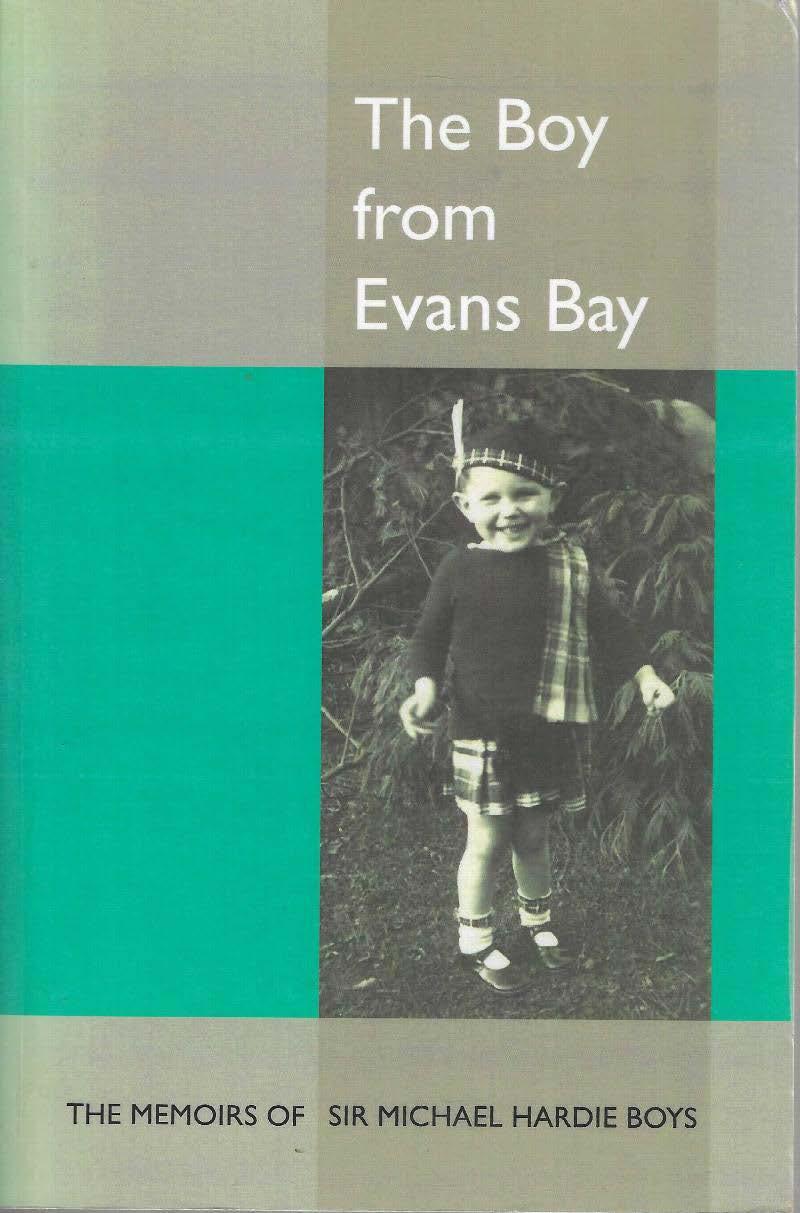
Michael married Mary Zohrab, who was studying fine arts and went on to a teaching role before developing her own artistic career. They had four children and settled into a comfortable, unpretentious life.
He was appointed to the judiciary in 1980, as a judge in the new High Court (replacing what had been known as the Supreme Court). In 1981, the family moved to Christchurch as he filled a vacancy on the bench there. Surprisingly, Christchurch seemed a very violent place; certainly, I tried a lot of murder cases, he wrote.
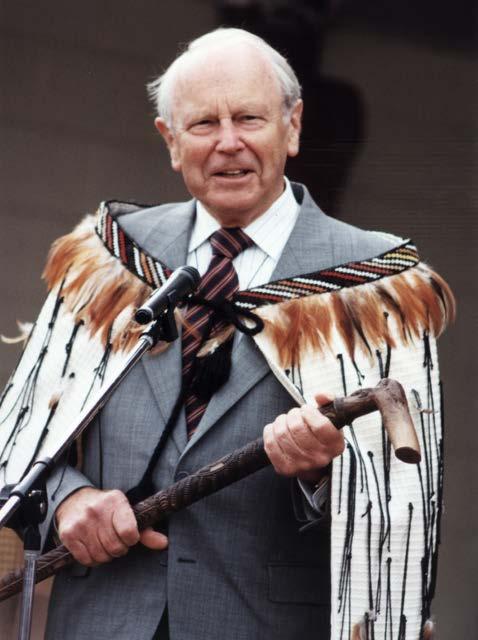
In 1989, he accepted a posting to the Court of Appeal, the pinnacle at the time for New Zealand judges, with the Privy Council in London still serving as the ultimate judicial authority at that time.
By 1995, with Dame Catherine Tizard’s comparatively flamboyant term as GovernorGeneral ending, the inevitable speculation about her successor circulated. Michael Hardie Boys was not among the pundits’ picks, and it was clearly not something he had come close to contemplating.
Nevertheless, when his appointment was confirmed, legal colleagues were keen to paint a picture of a man who shared an exceptional legal mind with an innate connection with ‘the person in the street’.
A judge of rare distinction… He’s a man of enormous dignity and human qualities, added Sir Geoffrey Palmer, the fourth Labour government’s leading legal brain who had persuaded Sir Michael to the Court of Appeal.
Distinguished, maybe, but little-known outside of legal circles, it seemed. As one journalist sent to write about him after the announcement noted, the exceptionally limited public profile of Sir Michael draws an awfully bland picture of this hitherto very private man beneath the wig.
The Dominion newspaper offered a more generous assessment of his virtues: good judgment, a knowledge of constitutional niceties, the ability to determine principles and apply them fairly; an astute judge of people, an ability to build rapport with politicians of all hues, steady hands. The evidence, the paper concluded, was of an excellent choice for the demanding times ahead

After all, the primary reason for the higher level of attention being paid to this erstwhile low-key judge was the fast-approaching 1996 election. It was to be the first under MMP, and hence the focus of plentiful speculation about scenarios that might play out, and the pivotal constitutional role the new GovernorGeneral might play in the formation of the country’s first MMP government; or, in case of a finely-balanced Parliament, if a confidence vote went against a minority government.
Sir Michael himself downplayed matters, at least publicly, delivering what time proved to be a realistic assessment of his likely postelection role – I don’t imagine that’s likely to happen, he told The Dominion. In fact, he conceded years down the track that it had been an apprehensive time, and while he didn’t need to test the constitutional boundaries – steadfastly maintaining that forming governments was for the politicians – the lead-up had been somewhat alarming, as the famously long-winded coalition bargaining between NZ First and both National and Labour dragged on, perilously close to the deadline for another election being required.
As it was, the politicians did sort it out; and within a couple of years, when that first coalition between NZ First and National imploded, Hardie Boys was far more sanguine. As he told an MMP seminar, political turbulence did not equal a constitutional crisis
The other element of his job which ensured that his name was no longer to be overlooked was in the race relations arena, particularly around Waitangi Day commemorations. At times in the mid-1990s the atmosphere at Waitangi had become febrile, leading the government to effectively boycott activities there.
Official ceremonies, including political leaders and the Governor-General, finally returned in 1999, although Sir Michael’s presence was overshadowed by an argument over the role of the activist Titewhai Harawira in escorting the official party on to the upper marae. As he said in his final speech as Governor-General, two years later, some of what he subsequently read about his reception ‘bemused’ him.
He made clear his resolve that Waitangi was the proper place for the official commemorations, returning there in 2000 even in the face of overblown concerns for his security, and another round of controversy over Harawira’s involvement.
He used his speech that year to urge a solution to the political tensions which had bedevilled the ceremonies, to acknowledge the distance that still needed to be travelled to deliver on the Treaty. He was to later lament the advice from the government in 2001 to again stay away, expressing his fervent hope that his successor would return. Indeed, he revealed he actively disagreed with the
decision, and in his memoir it was one of a few events he recounted which hinted at a frosty relationship with Helen Clark, who had become prime minister in 1999.
As he said in his farewell speech: Our very identity as a people requires us to commemorate our beginnings. How can we build a nation if we treat our founding as unworthy of celebration? How can we properly understand our present or intelligently plot our future without an understanding of our past?
While much of the role may have been the familiar ribbon-cutting, shaking hands and that dreaded small talk, Sir Michael clearly took seriously his unifying mission and his Methodist social conscience, attracting attention – and the inevitable raised eyebrows – for venturing into various sensitive topics, such as the failings of absentee fathers, the lamentable state of Māori health, and the impact of poverty on young people.
When his term ended it was quite a relief to be ordinary again, he wrote, including being able to wander into the local village in his old clothes and have no-one recognise him.
He declined further public roles but busied himself with family, the garden at his home in Waikanae, travel, and various trustee and patronage roles across a range of organisations. He also agreed to serve on the Court of Appeal for Kiribati, travelling up to the South Pacific island about half-a-dozen times to hear appeals.
Sir Michael Hardie Boys, GNZM, GCMG, QSO, KStJ, PC, died on December 29, 2023, aged 92. He is survived by his wife, Mary, and their four children, Deryn, John, Rachel and Philip. A memorial service was held at the Wellington Cathedral of St Paul on 31 January. The Post
Wellington College was well-represented at Sir Michael’s Memorial Service, with the Headmaster, senior staff, Prefects and members of the Kapa Haka in attendance.
Sir Michael was a great friend of Wellington College, not just as an Old Boy but also as our neighbour. During his time as Governor General, he was a frequent visitor to the College, ‘slipping’ through the side gate to stroll around the grounds, and to watch both cricket and rugby. He continued to support the College in many ways - financially and physically, and was a distinguished guest at our 150th Celebrations in 2017. His distinguished academic classmates of 6A Form Class of 1948 held many reunions across the years, all around the world. The Post

Nev. was born in 1939, the only son and second oldest child of five, of Sam and Muriel Kidd. He grew up in Karori where he lived in Messiness Road, just a few houses down from the Russian Embassy. Nev went to Karori Main School where he demonstrated a strong interest and ability in sports , particularly rugby , in which he always enjoyed the physical and competitive nature of the game. He also enjoyed tennis and cricket.
Nev started at Wellington College in 1952, leaving at the end of 1957, a year in which he was Head Prefect, RSM of the College Battalion and was in the 1st XV as a breakaway - a very strong team which won Quadrangular Tournament and featured a number of notable players including Brian Hasting, Dave Bone, Hugh Williams, Lance Leikis, Tubby Wright and others. Nev also enjoyed squash , always entered in the boxing tournament and also had a strong interest in rowing while in his last two years at College, associated with the Star Boating Club, although rowing was not then a sport sponsored by College. He had a strong sense of participatory-adventure which was to show through even more after Nev left College and how !
After leaving school, Nev joined the NZ Army, and in 1958 attended Portsea in Australia ( as opposed to Duntroon ) where he underwent Officer Training . Nev was not a ‘parade ground’ soldier - he was a ‘soldier’s soldier’ whose primary and only real interest was in ‘active service’. In 1959 and 1960, Nev saw active service with the RNZ Infantry Regiment in Malaysia, as a Platoon Commander. In 1961, he won selection in the NZSAS and then in 1962 saw active service with the SAS in Thailand, as Troop Commander. In 1965, Nev saw further active Service with the SAS - in Borneo, followed by even further active service, this time as 2 IC of NZs Infantry Company in Vietnam (1968/9), fighting the Vietcong (the SAS was not actively involved in anything at the time, although Nev was in fact still a member of the SAS ).
Following Vietnam in 1969, Nev ‘ran out of
wars and opportunities for active service’. He was appointed Commander of the NZSAS, based in Papakura, an appointment he held for two tours of duty - some six years . In January 1975, Nev was awarded the MBE in recognition of his outstanding military record and service for his Country. A ‘soldiers soldier’.
On retiring from the NZ Army and the NZSAS, Nev and his much loved wife Barbara ( with their children Russell , Joanne, Tony , Malcolm and Murray) bought a farmlet at Duck Creek, in the general vicinity of Warkworth and right next door to (a then much younger) Zin Zan and Robin Brooke and their family. In due course, Nev and Barb moved on, having bought a property at Monarch Downs, where they established a vineyard and an olive plantation and set about producing both wine and olive oil commercially. Eventually Nev and Barb ‘retired from ‘active service’, sold up and moved to Snell’s Beach, again in the relatively near vicinity. Nev passed away at home on 6 December 2023.
My twin brother Malcolm and I, and Nev grew up together in Karori, from pre-primary school days. We knew each other very well and were very close friends for some 75 / 80 years.
Nev was a relatively unique person (obviously). He had a great love of adventure and of the outdoors, reflected in activities he always really enjoyed such as sport , fishing of every sort, and the like - but of course reflected too, in particular, in his outstanding career in the Army, where he rose to the very top as a warrior and as a fighting man / leader.
Nev was very modest about his army achievements, but his career speaks for itself. He was a man of great bravery, courage, determination, achievement drive, resolve and loyalty. Furthermore, a man of absolute integrity. A true leader. But he was also always great company, a great enthusiast - a great friend who enjoyed and lived life to the full. He was a wonderful husband and father.
Nev was an outstanding ‘product’ of Wellington College. One of our very best. We salute him too, as an outstanding New Zealander. Hugh Perrett (Class of 1956)
Michael devoted the majority of his working life to the furniture retail industry. His career started in 1960, at the age of 20, when he enlisted as an enthusiastic salesman in his father in-law’s (Maurie) retail outlet Woodcraft Showrooms, corner of Willis and Mercer Streets, Wellington. Michael took ownership in the late 1960s, and Woodcraft Interiors evolved. The store lead the way in
New Zealand, fully incorporating furniture with home accessories, carpet and lighting, in ‘real’ room settings. It was the first time customers could somewhat effortlessly envisage interior wares in their own homes.
There is no denying Michael had a phenomenal flair for design and that he was an exceptional salesman. In the late 1980s, he was recognised as being at the top of his game and was approached by a group of prominent Wellington businessmen to set-up the ‘best’ furniture store in New Zealand. Theme was launched on the corner of Victoria and Bond Streets, Wellington. An opulent furniture and kitchen / glassware store. It was the first in the country to house its very own café, (up until this time department stores had tearooms, but in-house cafés were unheardof).
Sadly, the 1987 stock market crash bought an abrupt, untimely end to Theme. People just didn’t have the funds to lavishly decorate their homes. Eager to get back on his feet again, Michael reopened Woodcraft Interiors in exactly the same location as his career had started.
Then in late 1990, Michael was dealt a second blow; in the wee hours one morning Woodcraft Interiors burnt to the ground. He lost everything! Not one to give up easily, he salvaged what he could and moved the items into a vacant premise across the road. Aired and restored, all the pieces miraculously sold. Michael the retail visionary had a revelation. He recognised that in times of recession people weren’t inclined to purchase shining, new processions. He conceptualised furniture made out of recycled flooring – it was a hit!
In 1991 Country Theme’ was born, specialising in recycled wooden furniture. At its peak, in the turn of the millennium, the business had eight branches in Wellington, Auckland, Takapuna, Christchurch, Hamilton and Japan. That the Hayvice family name remains synonymous with furniture.
Journalist, commercial radio pioneer, band manager and music lover - David Gapes kicked open many doors. He fought a state-owned monopoly and won. He brought rock’n’roll and pop music to our radio waves and managed one of New Zealand’s premier acts
In 1965, David Gapes, who was born in Wellington 23 years earlier, was a journalist at NZ Truth. He had a no-nonsense approach to investigating and wasn’t shy about asking questions of authority figures.
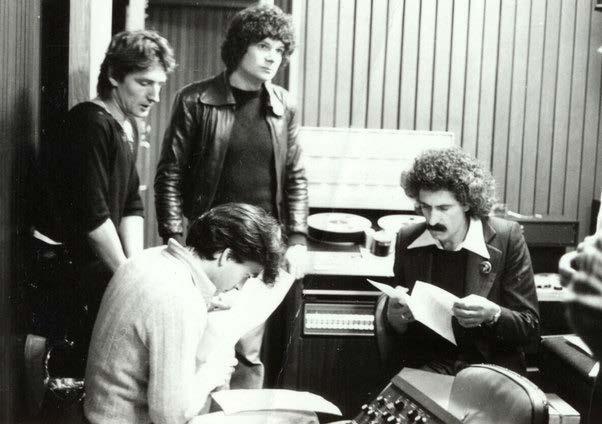
At 23, David was also part of the rock’n’roll generation. Elvis Presley and The Beatles had changed the course of music forever.
The Beatles had visited New Zealand in 1964 and New Zealand had its own music stars — Johnny Devlin, Max Merritt and the Meteors, Ray Columbus and the Invaders.
But broadcasting was still very much controlled by the government, and commercial radio licences were not available. Only half an hour of pop music was broadcast during the week and the radio waves were full of racing commentaries. Change was well overdue.
David began his journalism career in 1959, working for The Evening Post in Wellington for three years and at NZ Truth in Auckland for a short time, before heading to Sydney for two years at The Daily Mirror
While in Australia he heard of attempts to set up private radio in the northern hemisphere — an unsuccessful broadcast off the Scandinavian coast and Radio Caroline in the English Channel.
When he returned to Wellington in 1965, David was struck by how New Zealand radio broadcasting was still stuck in the 1930s. He was sure that the government would never agree to a land-based radio licence — the New Zealand Broadcasting Service (NZBS) had been set in up the 1930s and was considered by the government to be an essential communications medium.
And even though the NZBS was replaced by a supposedly more independent organisation with the creation of the New Zealand Broadcasting Corporation (NZBC) in the early ‘60s, the new organisation was in no hurry to allow competition by handing out private licences — the NZBC was effectively a staterun monopoly.
Although he had no technical or business knowledge on how to set things up, David
decided a pirate radio station was the way to stick it to the man. Over drinks at a Willis Street Pub, he discussed things with another journalist, Australian Bruce Baskett, who was working for The Dominion newspaper.
Baskett was prepared to put in some money, and after agreeing that Auckland - with its larger population - would be a better city for the venture, the pair decided they would give up their jobs at the end of 1965 and head north.
David soon came up with a plan to moor an internationally registered vessel outside the then three-mile (4.8km) limit of New Zealand’s territorial waters. Consulting a map, he found there was a small triangle of international water between Great Barrier and Little Barrier Islands and the Coromandel Peninsula. Mooring there meant they would be a mere 80km from Auckland city and could potentially reach a large audience.
The rest of the year went by with David and his wife Wendy saving as much money as they could while they consulted with technical experts - including radio enthusiast Denis ‘Doc’ O’Callahan and a marine surveyor to help find a suitable vessel. They moved to Auckland over the summer of 1965-66, where David canvassed potential advertisers and gained more confidence an independent station would attract advertisers.
As the months went by, they ironed out other technical problems, including planning to use pre-recorded tapes to broadcast shows to get around the problem of playing records on a swaying boat. But their finances were dwindling and it was hard to attract investors, so a newspaper story written by Adrian Blackburn, published on Easter Saturday, April 9, 1966, in The New Zealand Herald was part of their plan to attract more capital and public support.
Two ex-NZBC employees, Derek Lowe and Chris Parkinson, were shocked to read the story. They too had been planning a private radio station, and the subject had been in their minds for several years. When they joined forces, Parkinson, a goldenvoiced announcer and studio technician, and Lowe, who had set up a commercial and jingle production company, were a perfect complement to the venture. Other announcers, including future promoter Ian Magan, would soon sign on.
Plans to set sail and begin broadcasting were met with many setbacks — after towing MV Tiri from Gisborne to Auckland for a refit and transmitter installation, the Marine Department kept finding compliance reasons
to knock them back. Several attempts to set sail were stymied; the authorities took them to court and lost.
On Sunday 23 October, 1966, public support swung massively their way when the police tried to stop Tiri entering Waitemata Harbour by lowering the drawbridge on Auckland’s western viaduct so the vessel couldn’t get through. David and his fellow pirates sat in harm’s way under the jaws of the drawbridge so it couldn’t be lowered, and eventually Tiri was under way. But David and his crew were arrested and loaded on the police launch Deodar for a trip back to shore and a night in the cells.
More public demonstrations followed in the weeks following, and after a court case that found in their favour on 7 November, 1966, Tiri quietly slipped into the harbour. Test transmissions on the frequency 1480AM began on the evening of 1 December, 1966, but strong winds knocked out the transmitter mast. Radio Hauraki started broadcasting again from 4 December.
With a format aimed at a young audience, the station played pop and rock’n’roll hits. They kept the playlist fresh, relying on a network of airline pilot friends to bring in new releases from overseas, playing local releases and showing support for NZ recording artists. Public support and audience numbers grew.
Surviving wild conditions at sea, a shipwreck of Tiri (they continued with a new vessel, Tiri II), the death of announcer Rick Grant at sea, heavy-handed political opposition and financial hardship for four years, Radio Hauraki was eventually granted a licence. On 26 September, 1970, it became the first privately owned commercial station to broadcast legally in New Zealand since the 1930s.
David Gapes stayed on as an executive at Radio Hauraki until 1977. He dabbled in other ventures, including the birth of Hot Licks, a monthly rock music magazine co-founded in 1974 with Kerry Thomas of Direction Records and edited by Roger Jarrett. Hot Licks lasted 27 issues and ceased publication in 1976.
By 1977, Radio Hauraki was a far more corporate affair. David was forced to sell his shares in Radio Hauraki and move on. His next adventure would be as manager of Hello Sailor.
While he hadn’t managed bands before, he had shown plenty of support for local artists. When Headband, fronted by singer Tommy Adderley, released their second album Rock Garden in 1975, David wrote the liner notes. In late 1977, David met at his Birkenhead home
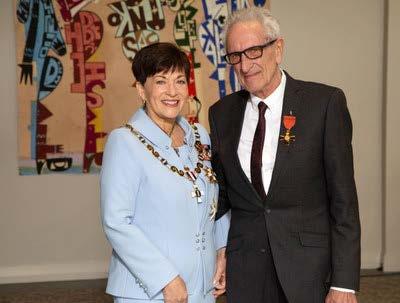
But the elusive recording contract didn’t come through. Time was running out, and so was the cash. David had taken a gamble on Hello Sailor and subsidised their existence there, using his own money. He wanted to hold out a bit longer, but it wasn’t to be. The band stayed in LA from August 1978 to February 1979. As the money ran out, David and Hello Sailor went their separate ways. After returning to New Zealand and taking on Phillip Mills as their new manager, Hello Sailor headed for Australia, a plan that David had always rejected.
Thirty-five years ago, Blair Wingfield was making a decent living selling life insurance. What he didn’t realise was that he was ineligible for his own policies. I was selling stuff I couldn’t buy. I didn’t qualify.
The 39-year-old had undiagnosed acute myeloid leukaemia (AML) – at the time a serious and uninsurable blood cancer that was causing a rapid deterioration in his health. I didn’t feel 100% and I had no energy. I also had a huge bruise on my leg. I kept wondering if I had banged myself on the table.
Hello Sailor members Graham Brazier, fellow Old Boy, Dave McArtney (Class of 1968) and Harry Lyon. With a loyal following and having completed their debut album, they were a band on the way up and urgently needed management.
David and Hello Sailor were the catalyst for a change in booking strategy at the Gluepot in Ponsonby, Auckland, where original music wasn’t regarded as important as cover acts. Since 1967, a band called The Radars, comprising blind and near-blind backing musicians, had held a residency. They had moved aside in 1976 but cover bands were still the norm. David pushed the bookers hard to get Hello Sailor into the big room and they were sceptical at his prediction that they would fill the room. They filled the room three nights in a row and ushered in a new booking policy, with acts such as Citizen Band, Th’ Dudes, and Mi-Sex soon to follow in their path
The Rum & Coca-Cola tour of 1977 was hugely successful by local standards, John Dix wrote in Stranded in Paradise Grossing over $30,000, it pioneered the pub rock circuit of the late -’70s, as well as introducing the era of the big PA, the lighting rig, the crew. With David at the helm, Hello Sailor brought a new level of professionalism to New Zealand rock.
After recording their second album Pacifica Amour in 1978, David and Hello Sailor headed for Los Angeles. Through his contacts, he was able to secure a rental property - at 8888 Hollywood Hills Drive - and get the band working visas for six months. The band played and partied hard, and David pushed them as hard as he could.
Hello Sailor did get gigs in Los Angeles. The highlights included playing at the Troubadour for a music industry crowd, and opening for the Knack at the Whisky A Go Go in front of recording industry movers and shakers. The Doors’ Ray Manzarek joined them onstage.
Back in New Zealand, David and old friend Tommy Adderley joined together in a cafe/club venture, The Green Door (aka Tommy’s Place and the Greasy Spoon). But Adderley’s old drug habits brought persistent inquiries from a patron and he gave in to his demands in order to get him off his back. The patron turned out to be an undercover cop. In 1980, together with David, he was arrested for supplying morphine and allowing a club premises to be used for drug use. Both Adderley and David were convicted and served prison sentences.
David eventually returned to journalism, at the Star in Auckland during the 1980s. He was the first editor of film and television industry magazine OnFilm, and later the editor of AdMedia, a long-running trade magazine for the advertising and media industries.
It was a role that fitted like a glove for David, who had the vision to bring advertising to radio waves and establish a commercial presence with Radio Hauraki in the 1960s, and had gained respect from senior professionals in the media and advertising industries.
After AdMedia wound up with the decline of print magazines, David joined the march to online media, editing M+AD, an online news resource for the advertising and media industries.
David was a true rock’n’roll pioneer and one of the original Hauraki ‘Good Guys’. In founding Radio Hauraki he set New Zealand’s radio waves free, expanded the nation’s musical horizons and helped to promote many of New Zealand’s performers, including taking a shot on one of our greatest acts, Hello Sailor
In 2019 he was named Officer of the New Zealand Order of Merit in the Queen’s Birthday Honours list for services to broadcasting. He died in March, aged 81. NZ Herald
Encouraged by his wife, the father of two young boys decided to get a blood test. The next day his doctor called him in to his surgery and told him he had leukaemia. I thought ‘oh, not only is that a nasty word, it’s pretty deadly’. I couldn’t believe it. I’d always been as fit as a buck rat and then, all of a sudden, kaput.
Blair later learnt that his condition had been so bad, his doctor didn’t expect him to live through the night.
Blair needed an immediate injection of white blood cells. Fortunately, a doctor in the cardiac unit next-door had compatible cells. They took them off her and injected them between my toes – the only place they could find a good vein. If she hadn’t given me those cells, I wouldn’t have made it through the night. It was that touch and go. I was literally bleeding to death.
Blair’s next stroke of luck was being treated with amsacrine. At the time the drug was thought to be revolutionary, but compared to modern, targeted treatments for AML, the side-effects were severe. It’s rotten, yellow, stinking stuff that saved me.
Since Blair’s diagnosis thirty five years ago, AML treatment has developed substantially and the side effects have significantly decreased. It was like, up against the wall, get a shotgun, blow you apart and then sweep all the bits together and say ‘oh you’re strong enough to have some more chemo now. They did that for 18 months, in five-week cycles. Every cycle I’d go home and vomit for three days.
He also lost all his hair, developed multiple blood clots and permanently lost feeling in some of his fingers. But he survived. His last treatment was in February 1983. As far as I know I’m the only one who’s still around. People say you’re cured but I wouldn’t be that presumptuous. That’s just how I handle it.
Right from the beginning I knew what I had to

do to stay alive – trust the doctor, have faith in myself and family and surround myself with positive people.
Blair’s incredible survival has earned him the nickname ‘Miracle Man’.I can’t run away from it. I met a woman in her 70s recently and she said ‘oh you’re the ‘Miracle Man’. I always get embarrassed when people say that.
What he’s not embarrassed about is the role he’s played in helping people stay positive in the face of their own blood cancer diagnoses. Just the other day I had a guy text me saying my example had helped him survive 15 years with the disease. There’ve been lots of examples like that.
He’s also proud of his role in helping shape Leukaemia & Blood Cancer New Zealand into the organisation it is today. When we started we had a budget of $135,000 and two parttime staff. We’ve now got a work-force of 20 full-time staff, have sponsored a room in the new Motatapu Ward at Auckland City Hospital and have been instrumental in establishing the Leukaemia & Blood Cancer Research Unit at the University of Auckland. It gives me goose bumps when I see what we’ve achieved.
Blair’s hard work on behalf of LBC was recognised in 2015 when he was appointed as an officer of the New Zealand Order of Merit for his contribution to health and sport.
I’m better than I ever imagined I could be. I’ve now got grandchildren who are older than my kids were when I was diagnosed. But I can’t run away from the responsibility. It’s a prick of a disease. And it’s hard to spell.
Leukaemia & Blood Cancer NZ
Blair was also was a Trustee of the South Pacific Bone Marrow Transplant Trust which put transplant units into Auckland and Starship Hospitals. He coordinated efforts
to diagnose blood cancer research and raise funds for haematology treatment through events such as the '100 Hole Golf Marrowthon'. He was also instrumental in establishing the NZ Cord Blood Transplantation Appeal Trust. Prior to moving to Katikati, Blair was involved for many years at Pakuranga and university sports clubs as a referee and coach of rugby, cricket and soccer. He has also contributed to the community for the past 40 years as a Rotarian. He established the Wingfield Medal at St Kentigern College, to be awarded to the student who exhibits pluck, endurance or the capacity to triumph over difficulties. SPBMTT
I had the privilege of knowing Blair personally for many years and found him to be a humble and generous man. His deep love for his wife Jean, his sons, grandchildren, and life itself was evident. Blair’s dedication to Wellington College was clear, and I always enjoyed his calls, especially from the Tauranga Morning Tea Club, which we frequently feature. He had a close-knit circle of friends and schoolmates, including the late Roger Moses, Hugh Perrett, and Bruce Waddel, who all shared his passion for keeping up with news from the school. The messages we received upon Blair’s passing truly highlight what a wonderful friend he was. Steph Kane
The recent death of Ian Balfour ‘Mitch’ Mitchell marks the passing of a man who has been a mainstay of Marlborough for nearly 50 years. He had an outstanding working career, was a huge family man and a tremendous contributor to the local communities.
Ian was a man passionately interested in people and the concerns they were dealing with. He loved to find a way through the woods and reach a helpful conclusion. He had excellent people management skills, in part because it was never about himself but always about helping others, often with a glint of mischief in his eyes.
He was a man who treasured the land, the sea, the mountains and the rivers of Marlborough, and their protection and advancement was in a real sense, his life’s work.
His work in helping the local iwi get Omaka Marae established was typical of Ian’s approach. He loved being at the sharp end of the shovel and was never one to get bogged down in esoteric arguments. Kiley Nepia, who spoke at the funeral on behalf of the local tangata whenua, acknowledged Ian’s contribution to the marae over 40 years and how he had been made patron in recognition of his unstinting efforts.
Born in 1943, Ian grew up in Wellington, the son of Sir Hamilton and Lady Frances Mitchell. The redoubtable Sir Hamilton (known as Pete) was a national figure as president of the RSA. Ian had a wonderful stable childhood, but early attempts at staving off the boredom of early adolescence often led to visits to the family home by the local community constable. Ian and his older brother Bill built huts in the Tinakori Hills and lit the odd fire that got away … and then there was the incident of all the car tyres in their street being let down.
He attended Northland School and Wellington College, where his main claim to fame was being Captain of the 1st XI Hockey team for three years. Then Ian chose a career in farming, perhaps influenced by time spent on his uncle’s farm in Shannon. At the age of 21, he went down to Lincoln College in Christchurch to study for a three-year Diploma in Valuation and Farm Management, having spent two years working on three farms to complete the practical side of the course
He won a rural farm cadetship which gave him funding and mentoring, in return for being bonded to a government department on graduation.
All students had to live in Ivey Hall for the first year at Lincoln, and Ian quickly became known for his incredibly orderly living habits. We used to visit Mitch’s room - not to see him but to marvel at his bed-making skills. Not only that, but all his clothes were laid out very neatly and it was something to behold, recalls fellow student Bill Wills. Ian was also on the Lincoln student executive and one capping stunt involved the students, all dressed up as waiters, carrying a bottle of whisky, ‘The Spirit of the South’, from the Mayor of Dunedin to the Mayor of Christchurch in relays, running day and night. It was a very close-knit course and their reunions over the
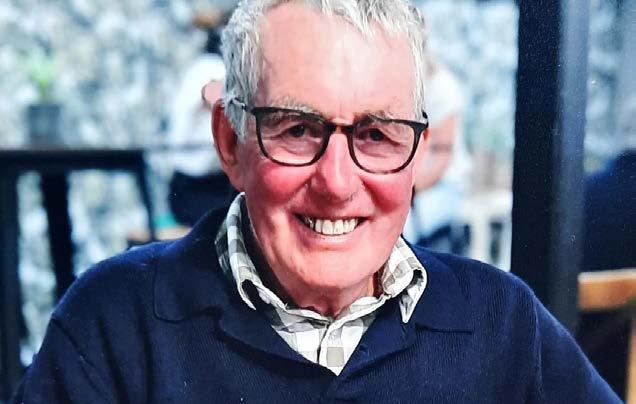
subsequent decades were something Mitch always treasured.
He married Keren who was to be his partner of 57 years. Meeting her was my lucky day, he once said, and she has described living with him as like sometimes being in a whirlwind. He was constantly on the go and full of plans and ideas.
After graduating, Mitch joined the Department of Lands and Survey in 1967. In the mid-1970s he became the youngest Commissioner of Crown Lands ever appointed and his long-term love affair with Marlborough began.
Ian had an enduring relationship with Molesworth Station stretching back nearly 50 years. One of the first tributes read out at the funeral came from Don and Ann Reid, who ran Molesworth very successfully for more than two decades and who said that Ian’s support was ‘greatly appreciated’ and acknowledged the special relationship that Ian had formed with the previous manager, the legendary Bill Chisholm who ran the place for 36 years.
On the Molesworth Steering Committee, which Ian was a member of for many years, he and his mate Hamish Ensor were true circuit breakers. They understood the arguments around the confluence of conservation, recreation and production and how to draw them together for the sake of the station.
Following a distinguished contribution to the Department of Lands and Survey, he became General Manager of the Marlborough Catchment Board. When that was absorbed into a regional council, he worked for them, and then decided it was time to strike out on his own. He and Keren purchased an apple orchard out at Cranbrook near Blenheim and then converted it into grapes.
His contributions to community organisations, especially around resource management were tremendous. He was a Marlborough District councillor for six years, chairing its environment committee where he did an excellent job of allowing discussion to flourish but then pushing it towards a conclusion when it was becoming too wayward.
He was on the Marlborough Conservation Board, the Tuia 250 celebrations, was a strong supporter of the Southern Valleys Irrigation Scheme and the Hospital Equipment Trust. Gerald Hope also paid tribute to Ian’s contribution to the setting up of the highly successful Marlborough Wine Research Centre, now the New Zealand Wine Centre.
But the achievement Ian was most proud of was the family life he and Keren had created with their three daughters and their families. On a sports day you could generally find Ian out there in support of the grandkids, regardless of the weather.
Ian loved his tennis, his Beef and Burgundy lunches (a cunning excuse to sample fine wines, he once said), and he and Keren became great travellers in their retirement, both in New Zealand and overseas.
Looking back on his life, it is hard to see how he could have fitted any more in. Ian was a giver in all circumstances, and generosity was his byword. As Bill Wills said: Ian was a man who was very easy to love, and we all did.
Ian Mitchell died peacefully at home in February, 2024. Stuff.co.nz
John died suddenly in Auckland of a massive heart attack while he was preparing his beloved boat, Mollymawk, for another trip on the Hauraki Gulf.
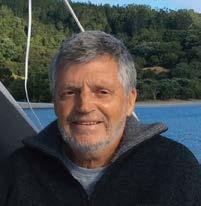
He is sadly missed by his wife of 55 years, Donna, his daughter Emily Furrell and her husband Hamish and their children, Enda and Rosalie, his son, Tim and his fiancée Beccy Meares and their young children, Jax and baby Ray. Also by his brother Andy Marchant (class of 1972) and his wife Kath Hardwick.
John was born in Christchurch in 1943, spent much of his childhood in the South Island and remained a true Mainlander at heart. He attended Wellington College from 1957 to 1961. He did not enjoy compulsory team sports and somehow managed to avoid them. Tramping in the Tararuas kept him fit.
John began an Arts degree at Victoria but dropped out to work as a geophysical technician and helped produce the first gravity map of NZ. He returned to university to study geophysics, but decided he was more drawn to geology and transferred to Otago, where he met and later married his wife Donna Massey. He graduated with a BSc (Hons) in Geology and the following year he and Donna moved to Christchurch. John had been planning to do further study at Leeds, in England, but a chance encounter led to his decision to apply instead to Queens University, in Kingston, Ontario. This proved a much better choice and they both enjoyed the opportunities for outdoor activities, such as skating, skiing and canoeing available in Kingston, and the active social life of the very
large cohort of overseas graduate students. Ontario was very generous with financial support and Canadian immigration was welcoming. They travelled widely in Canada and the US. This was where John’s ‘sailing gene’ was activated when he bought and restored an Enterprise, a fast sailing dinghy.
John graduated in 1976 with an MSc and PhD in Geology. After a summer spent driving across Europe to Istanbul and back he found his first teaching position, a sabbatical replacement at McGill University in Montreal. The following year he had a post-doctoral position at Chicago University, but returned to Canada to teach at the University of Toronto, in 1979. By now the situation in Canadian academia was tighter, and tenure was not so readily granted. Daughter Emily was born in 1985 and John and Donna decided to return to New Zealand where son, Timothy was born in 1989.
John began a new career as a consultant. This led to an eight-year venture in working in Vietnam, where he and his associates were involved in a nickel mining project. John then established his own consulting firm based in Devonport. Subsequent work took him to West Papua, China, (where he was exploration manager for a joint Australian British company), Tibet and later Mongolia as well as around New Zealand. He wrote at length of his travels and impressions of these places, and always intended to publish an account of his adventures, but sadly it did not get done. He did however write and self-publish a Marine Radio Handbook during a downtime in mining exploration. This ran to three editions and sold 5000 copies altogether.
Sailing was John’s other great passion and our family owned a Whiting 29 yacht aboard which we explored the Hauraki Gulf over the last 28 years. He suffered his first heart attack while sailing alone eight years ago, but did not let this end his sailing career.
Travel was also important, and we were fortunate to be able to make several trips back to Canada and the States, Europe, Russia and Mongolia, as well as to Australia. John’s favourite Far North Queensland was an escape from cold wet winters. John loved wild and exotic places and his profession was ideal for opportunities to visit these. He retired at least three times and was drawn back to work in Kalimantan, Indonesia, and to prospect for Lithium and rare earth around New Zealand.
He was also interested in conservation, taking an active role in fighting the illegal export of swamp kauri, birds, art, music and gardening. History of religion was another interest, and he also began to research his family history.
His most recent enthusiasm was exploring back country roads in his new SUV. He had several health problems, but did not let these stop him.
Although he was proud of his academic and professional successes, his greatest love was his family. He adored his grandchildren and considered us very lucky to have both children living nearby in Auckland. He was clever, kind and generous and we all miss him terribly. Donna Allen

We acknowledge the passing of a special friend from the Class of 1966 cohort, Graham Johnson (Des). Long-legged, sharp mind, cheeky grin and action mentality led to friendships with many at College. Graham also had a brief spell at Firth House in his sixth form year, and went on to Engineering School in Canterbury.
The 1966 edition of The Wellingtonian reminds us of his long legs – with a picture showing David Howman challenging John Fyson in the school 880yds but with Graham Johnson just behind, eventually coming second to Howman. He was second to Stewart in the mile, and a commendable second in the McEvedy Shield mile that year also.
Graham’s career as an engineer and project manager extended to a leadership role in many notable buildings for which he earned great respect within the construction industry. These projects included in Wellington the Park Royal Hotel, Parliament Buildings, National Library, Wellington Airport, and in Auckland the distinctive Northern Northern Mills Fort Street commercial building amongst others.
His cooperative and practical style, along with an inquiring mind quick to acknowledge the input from others in the team, contributed to his recognised success in the industry.
Besides carrying on his engineering and handyman pursuits in his home life, Graham
enjoyed activities of all kinds especially fishing, diving, surfing, friends, dogs, outdoors and their special haven at Pukawa, on Lake Taupo.
Graham displayed typical courage and good humour throughout a long illness, wonderfully supported by his loving family Aly, Charlotte and Amalia. A life well lived – we will miss you. Malcolm Hope (Class of 1966).
With a profoundly heavy heart I am reporting the desperately sad news that Cam passed away peacefully on 26 February, 2024.
He battled with his illness head on over a long period of time and showed such strength and stoicism in trying to get the better of it. I don’t think anyone in the world would have fought this horrible disease in the way he did and with such a positive mindset throughout. He was an incredible human being in this regard.
Cam joined Tabard RFC in the summer of 2008 from Rotherham Titans in south Yorkshire and made over 350 appearances for the club until he retired in 2022.
He is the longest serving captain of the club and skippered the 1st XV from 2008 until 2014. From 2015 until 2022, he became player/coach and from the point of his arrival until he retired his overall commitment and passion for Tabard was second to none.
He was a very talented back rower and as captain lead by example on the field. A strong ball carrier and with a clear sense of direction his no nonsense approach to the game benefited the club immensely. Respect from players, spectators and back-office staff at the club is immense and puts him into that Tabard legendary status.
Off the field Cam was an absolute gentleman. He had a very gentle, caring nature and a lovely cheeky smile that made him a very endearing individual.
For the past couple of years he was working for a social inclusion charity called School of Hard Knocks taking on the role of mentor and rugby coach for young students struggling to stay in mainstream education. The students loved Cam and he will be sorely missed by these schoolchildren.
As a New Zealander he was mad about rugby and his passion for the sport rubbed off on many young players coming through the ranks at Tabard. All will tell you that he was hugely inspirational and was an outstanding leader on the field.

He has been taken from us and his lovely young family ridiculously early and our hearts go out to Jo, his lovely wife and to Ava his beautiful daughter.
May you rest in peace Cam.
Ross Hopcroft, President
While Cam was only at Wellington College for one year, he made a lasting impression on fellow classmates and 1st XV teammates. Those in New Zealand unable to attend Cam’s service in England were quick to rally and share their memories of Cam for his family and friends. In a touching tribute, coordinated by classmate Tom Murdoch in conjunction with Headmaster, Glen Denham, members of the 2024 Wellington College 1st XV delivered a heart-felt haka that was subsequently played at Cam’s service.
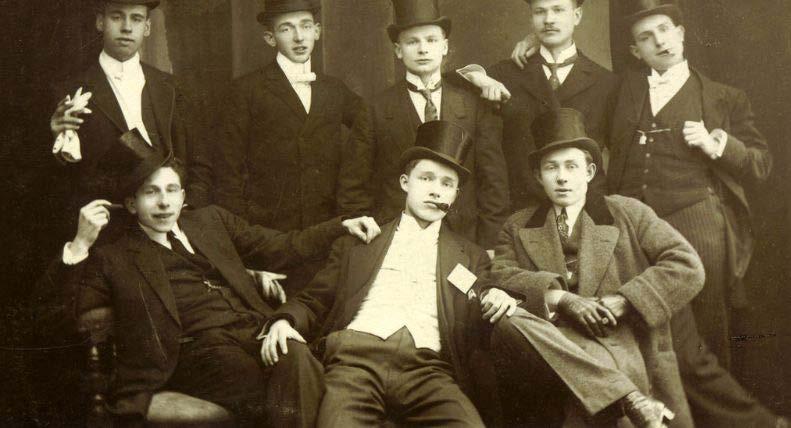
JULY 26
CLASS OF 2004 REUNION
3.00pm @ Wellington College - Meet the Headmaster, Cohort Photo and a tour of the School.
4.30pm: Beers ‘n’ Bites Off-site
OCTOBER 18
CLASS OF 1984 REUNION
9.30am @ Wellington College - Morning Tea, Meet the Headmaster, Cohort Photo and a tour of the School.
6.00pm @ Wellington College - Drinks and Dinner.
25
CLASS OF 1974 REUNION
9.30am @ Wellington College - Morning Tea, Meet the Headmaster, Cohort Photo and a tour of the School.
6.00pm @ The Wellington Club - Drinks and Dinner.

NOVEMBER 1
CLASS OF 1994 REUNION
3.00pm @ Wellington College - Meet the Headmaster, Cohort Photo and a tour of the School.
4.30pm: Beers ‘n’ Bites Off-site
22
CLASS OF 1964 REUNION
9.30am @ Wellington College - Morning Tea, Meet the Headmaster, Cohort Photo and a tour of the School.
Noon @ The Wellington Club - Drinks and Lunch.
Each cohort will be contacted separately with registration and programme details. Make sure your email address is current!
SCHOOL ANZAC SERVICE
Monday, 29 April @ 10.30am
@ the AGC College Hall with Morning Tea to follow.
WCOBA AGM
Wednesday, 22 May @ 11.00am
@ Cricket Pavilion with a light Lunch to follow.